MYTHS CREATE BARRIERS
Misconceptions about what a career in accountancy actually entails may be creating unnecessary barriers for many young people, preventing them from seeing accountancy as an attainable career option.
New research from Grant Thornton shows these misconceptions could be limiting the potential talent pool of the profession.
Exploring Gen Z’s views of accountancy as a career, Grant Thornton discovered 62% of respondents believed you need high exam grades to become an accountant. Another 57% said you need to go to university, and the same percentage thought training for the qualification is expensive.

Over half also see accountancy as a sedentary profession – 53% think accountants sit at a desk all
day!
The worry is that two-thirds of young people surveyed have never received careers advice about accountancy. However, those attending private schools are 20% more likely to have been given careers advice about becoming an accountant than those from comprehensive schools. Private school students are also more likely
to know a real accountant than those going to a state school. Gender is also found to impact young people’s perception of accountancy as an attainable career. Men are 13% more likely to believe that they can become an accountant than women. Nonbinary people are less likely than both men or women to feel a career in accountancy is possible.
Grant Thornton’s head of inclusion, diversity and ESG, Jenn Barnett, said: “It is clear that the accountancy profession needs to work harder to bust historic misconceptions. There remain clear misunderstanding about not only routes to entry but also the scope of the career on offer, which may be preventing many from considering it as an option.”
Barnett stressed: “The school you attend, your background or gender should not dictate your access to information or the career path you follow, yet our research shows that these factors contribute to the level of exposure to and understanding that a young person may have of the profession.”
• Grant Thornton has launched a myth busting campaign ahead of its 2023 trainee recruitment window.

WHERE ARE THE WOMEN?
Why are women still underrepresented in the very top positions at the Big 4 accountancy firms, asks Dr Patrizia KokotBlamey (pictured) in her new book.
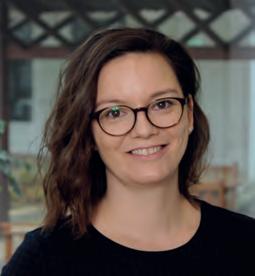
Women’s access to the professions has improved remarkably over the past 20 years, and professional service firms, such as the Big 4, have invested heavily in equality,

diversity and inclusion drives. She says some, such as Deloitte, regularly feature in ‘Best Workplaces for Women’ rankings, but the number of women at the very top has failed to budge significantly over the same period. It means women make up just over 20-23% of partners in larger firms.
In her new book, ‘Gendered Hierarchies of Dependency’, Kokot-Blamey analyses this stickiness at the top of the profession. She found that the price of making it to the top is still frequently motherhood, indicating that flexible working and equal opportunity initiatives continue to fail. “There is nothing wrong with prioritising one’s career, but for many women giving up family life and motherhood in this way will be a cost too high to pay,” says KokotBlamey.
She also queries whether a focus on performance, blind recruitment and data-driven HR interventions has done anything but alienate people from one another. KokotBlamey explains: “We all spend so much time at work and, at the same time, work for many of us is no longer a place where we develop friendships or relationships of trust. A shift away from relationshipbased hiring has succeeded in getting more women through the door, but when we look at it comparatively, we can see that they are not as secure in their positions.”
Incorporating NQ magazine www.pqmagazine.com/www.pqjobs.co.uk October 2023 o.uk ISSUE250th

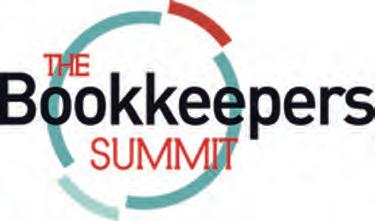

Joinhundredsofbookkeepers foradayofinspirational speakers,learningand networking.Nottobemissed! BOOKNOW THE ICB BOOKKEEPERS SUMMIT 2023 6th Nov 23 Park Plaza Westminster London
IN THIS ISSUE
A note from the Editor
Welcome to the 250th issue of PQ magazine. I want to thank everyone who has helped us get to this amazing milestone, and I’m sorry that there are just too many people to thank individually.
Since 2003 we have been there by the side of PQs, shining a spotlight on the profession. You can check out what some people think of how we have done on page 21.
This month is no different – our job is never done. We have just received news that AAT is promising to deal with all platform-related student complaints within five days. It has also made the decision to issue estimated results for any student who meet the following requirements:
1. Sat MATS between 1 September 2022 – until further notice.
2. Received a zero-score for Task 5 and/or Task 6.
The AATs special consideration policy was updated from the week commencing 11 September 2023.
Our joint free in-person seminar series with Queen Mary University of London is also back. In October we will be looking at creating the ethical accountant. See page 11 for more.
And, last and by no means least, PQ magazine has joined forces with VIVA Financial Tuition to offer three lucky ACCA PQs free tuition for the whole of their studies. See page 9 for all the details. Graham Hambly, Editor and Publisher, PQ magazine


News
4 CIPFA/ICAEW Accountancy bodies launch joint qualification
5 PQ October semin ar Creating ethical accountants is the theme of our upcoming seminar
6 Student survey You want more ethics and sustainability training, research has found
8 AAT 2030 strategy Association re-jigs internal structure to facilitate new plans
9 Plea to ACCA
Students in Pakistan struggling to pay subscriptions and exam fees
10 CIPFA exam results




All the latest pass rates, including the first for the new exams
12 Tech news SVOD – it’s good to share! Features, etc
14 Have your say
We really need to see our exam papers, ACCA; and how AI is going to change the face of accountancy. Plus our social media round-up
16 CIMA spotlight Last-minute tips for case study exam success
18 ACCA exam feedba ck
We run the rule over the September exams – so what was hot and what was grot?
21 Celebratin g 250 issues
We take a look back at the past 20 years – and share some kind words from the great and the good
24 Thank you PQ!
Karen Groves of e-Careers explains how PQ helped her in her studies, and why it is still an important part of what she does today
26 CIPFA/ICAEW initiative Accelerated route to gain CPFA and ACA qualifications set to deliver better career opportunities

27 Advanced tax
Keeping it simple –simplified self-employed cash basis questions
28 ACCA spotlight
Three simple steps to take to help you pass your very first accountancy exam
29 Study advice
How to move seamlessly from one phase of your training to the next
31 AAT exams
Q2022 means students will need to know more about payroll
– and we’re here to help
32 Sustainability
Net Zero Now explains what Scope 3 emissions are, and why they matter
35 The triple bottom line
When it comes to social and environmental reporting, we need whole truths not halftruths, says Robert Sowerby
p22
37 Student accommodation Increasing rental costs are creating barriers to higher education, says PwC survey
38 Working lives
Rachel Spence describes her experience of working in the legal sector as an AAT accountant
39 Careers Happiness in the workplace; tackling work/life balance issues; and our Book Club review
40 Fun
The lighter side of life – and accountancy
The columnists Lisa Nelson Theory and practice go hand-in-hand
4 Robert Bruce Audit reform – it’s the same old story… 6
8
Ann a Kat e Phelan One cable to rule them all 10 David Rothera Your planet needs you – now! 12
Prem Sikka Water giants flush money down the drain
To subscribe for FREE go to www.pqmagazine.com Octobe
r 2023
contents p18
Take the next step in your career with the CGMA® Finance Leadership Program. CFOs CFOs FUTURE WANTED
p21
LISA NELSON Theory and practice working together

CIPFA and ICAEW to launch dual qualification
CIPFA has unveiled a new accelerated route to gain both the CPFA and ACA designation, and dual membership with the ICAEW.
CIPFA’s head of qualifications, Anna Howard (pictured), told PQ magazine the private and public sectors are becoming increasingly interdependent. She explained that CIPFA is also “dedicated to providing the best possible career options for our students”.
To achieve dual status newly qualified CPFA members will have to take an additional module, Corporate Reporting, and complete
a statement of intent. Newly qualified ACA members will also be able to gain the CPFA designation by completing the
Public Sector Financial Reporting module.
Howard said: “This will mean that choosing to study a CPFA qualification does not limit your career options to the public sector for the first five years.”
She also believes the new dual membership will make students much more attractive to potential employers.
The new accelerated route to gain CPFA and ACA designations and dual membership will be launched early in 2024. If you would like to register your interest or receive further information email hello@cipfa.org
CIPFA and the ICAEW have been working more closely since late 2021.
World’s fastest accountant
Accountant and sprinter Eugene Amo-Dadzie (pictured) had to take time out of the day job to compete for GB at the World Athletics Championships in Budapest.

The senior management accountant didn’t quite make the 100 metres final, but had the 10th fastest time, and was just 0.02 seconds from making the final. He ran 10.03 in his semi-final heat.
As he told a BBC interviewer: “I am incredibly proud. I am a fulltime chartered accountant. How
dare I stand here in front of you and start being negative… I am ambitious. Don’t get me wrong, it would have been great to be in
Free ACCA guides
For many studying for ACCA and working as an accountant is just the first part of their career journey.
VIVA Financial Training believes ACCA students are ambitious, and are always looking to the journey ahead. That is why it has produced a series of
ground-breaking guides, which it hopes will offer insights and support and help allay many common doubts.
The guides cover everything from how to get a practising certificate and a salary guide –and there’s even something for the oft-forgotten affiliates!
that final, in the mixer… for me I have got to take the learning. And yeh man, I had fun, that is the main thing.”
Check them out at:
ACCA Affiliate - Your Ticket to a Thriving Career in Finance
ACCA Practising CertificatesEverything You Need to Know
Unlocking Opportunities - ACCA
aduate Jobs
What is ACCA Part Qualified?
Are
students Canary Wharf bound?
As the banks move out of Canary Wharf it looks like university students will be moving in. Search engine StuRents said that demand for accommodation in east London (that’s where Canary Wharf is) is the same as that of Bloomsbury, the heart of London’s university district. There is one problem. Canary Wharf currently has no purposebuilt student housing. However, applications for two students
blocks have been submitted to the local authority.
Accidental exam
We loved a story we recently read on one Facebook group of the PQ who ‘accidentally’ took the wrong exam. The AAT student in question booked POBC rather than ITBK. They missed the pass mark by 2%, which they said they were pleased about! We weren’t told if this was the first time they had sat the assessment or one they had already passed.
Anyone out there got a better story? We would love to hear from you, just email graham@ pqmagazine.com
New Access to Accountancy chair
Social mobility charity Access Accountancy has confirmed ICAEW COO Sharron Gunn as its new chair. Gunn replaces Hazel Garvey, who left the ICAEW at the end of June. Access Accountancy works to ensure that everyone has an equal chance of accessing and
progressing within accountancy based on merit, not background. Since it was established in 2014, signatories of Access Accountancy have included 25 organisations, incorporating the biggest firms in the sector, to improve access and progression within the profession for those from low socio-economic backgrounds. More than 5,000 work experience places have been offered to students that meet Access Accountancy’s criteria since 2015.

PQ the PQ Magazine October 2023 4
In brief In Oppenheimer, the movie, General Groves asks Oppenheimer if he was confident that when they were testing the atom bomb, the explosion wouldn’t destroy the entire world. Oppenheimer says that the chances of that happening were “near zero”, to which Groves repeats “near zero”. Oppenheimer replies: “What do you want from theory alone?” “Zero would be nice,” says Groves. This is an excellent example of the need to have theory and practice; they work together both in the real world and the classroom. It can, however, be frustrating for some learners who are being taught a theory without any apparent practical application, or at least one they can see. And yet it’s often the theory that helps us navigate the complexity of the real world in order to come up with solutions. Theories are academic models or frameworks that explain or predict what should happen, while practice is the application of knowledge, including theories and skills in a given situation. Many exam questions follow a similar structure, asking the learner to explain a theory before applying it to a given situation. And while theories can be memorised, if you don’t understand them you won’t be able to apply them. But what of those learners who don’t like or appreciate theories? The best solution is to ask your tutor what the theory will help you do. After that learn it, because one day it might help you solve an important problem – in theory at least!
Lisa Nelson is Director of Learnin g at Kaplan
Gr
Benefits
Opportunities
An ACCA Qualified SalaryWhat To Expect
and Career
Explained
ACCA EXAM FEEDBACK
ACCA students looking for the perfect exam experience may need to book the Imparando venue. Apparently, it is “always great”. One student gave it five stars, explaining the staff are always nice and helpful. The exam rooms and equipment are also good and “they just don’t
disappoint you”.
While many praised the centre, the same could not be said for the AFM September exam! In the Open Tuition Instant Poll, one in three sitters said the exam was a disaster, and another 41% said it was hard.
In stark contrast APM sitters
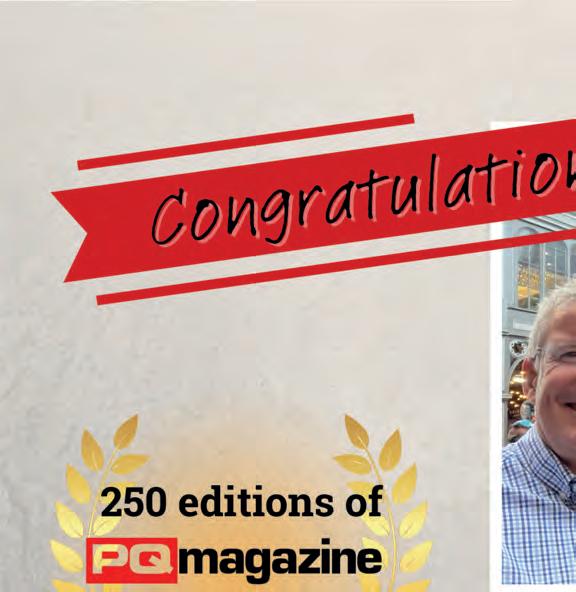
Save the date

Queen Mary University of London’s award-winning seminar series is back. The PQ team and a whole list of guests will be descending on Queen Mary University of London on Wednesday 25 October to discuss how the professional bodies create the Ethical Accountant.

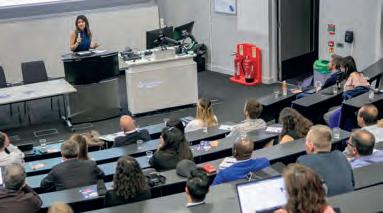
Over the coming weeks we will be assembling a panel of experts to see just how good a job is being done.

As always the event starts at 6pm sharp, but
left the exam halls feeling fairly confident, something that doesn’t happen too often. ATX sitters were also pretty happy, and there were not many complaints for the AAA examiners, either.
The new-look SBL exam seemed OK. However, some students felt the pre-seen was “largely redundant for the exam other than to give you the feel for the industry”.
September SBR exam was deemed a tough one, as was the PM exam this time around. PM was described by sitters as awkward, tricky and very tough! • For more feedback see page 18
AAT
assessment
problems are back!
AAT experienced core infrastructure problems at the end of August, with systems issues impacting assessments for several days.
The association told colleges it was working to establish the root cause and resolve the issues, and explained that its systems “are currently stable”.
AAT again apologised for any inconvenience this caused to sitters, and said students needed to submit an incident report so it can provide support and investigate the matter further.
As another academic year starts, one worried tutor said many students are not convinced that the ongoing software problems are going to be resolved any time soon.
AAT’s Claire Bennison told PQ magazine that while incident reports concerning the assessment platform remained low in August, it is continuing to prioritise dealing with emerging issues, fixing remaining problems, improving customer response and student experiences.
She also explained AAT recently experienced some tech issues caused by AAT’s firewall and its data centres. These were fixed in less than three hours.
PQ 5 PQ Magazine October 2023 PQ news
Sign
at https://tinyurl.com/3z4tvp5a
there is time for networking and a bite to eat before it all kicks off, so doors open around 5.30pm.
up
ROBERT BRUCE
More ethics please!
It is simply astonishing. Two events in the past month tell you everything you need to know about the importance of financial reporting. First up was the publication* of an account of the period in the 1990s when the government got behind efforts to make financial reporting rules thunderously effective. As Professor Geoff Meeks makes plain in the book, when the reform programme into its stride ‘inward portfolio investment in UK equities recorded a 20-fold increase’ and as his own research shows ‘London played a disproportionate role in international M&A’. This is exactly the sort of economic boost the UK needs at the moment. But politicians, only looking at the short term, fail to learn from history.
As became plain in August the government, for the umpteenth time, is kicking plans to reform audit and corporate governance into the long grass once more. It is the old story. And so the long-awaited replacement of the Financial Reporting Council with a much more powerful and influential Audit, Reporting and Governance Authority, vanishes into the mists of the future once again. Instead of, as the book makes clear, boosting the economy, the politicians have decided that things called audit will not boost their chances of being re-elected next year. Instead of doing something to benefit everyone they have chosen the route of simply benefiting themselves.
* ‘The UK Accounting Standards Board, 1990-2000: Restoring Honesty and Trust in Accounting’, by David Tweedie, Allan Cook, Geoffrey Whittington and Geoff Meeks.
Almost every accountancy student (97%) says their current curriculum does not sufficiently cover broader ethics, social or environmental sustainability issues.
Students also want to see more belief ethics, accountability and critical accounting in their studies.
The problem is that many students do not believe that they have any power to change the
accountancy curriculum themselves, and feel that the accreditation bodies have the most power to engender change.
A recent Rethinking Accountancy snapshot survey also found that only one-third of respondents believed their course prepared them for the world of work.
Money seems to be the big reason for studying accountancy.
Some 89% of respondents admitted that the prime motive to study for an accountancy degree was the high earning potential and not to have a social or environmental impact.
The number of exemptions that a student can get from a business school influenced 68% of students when choosing their degree.
Rethink Accountancy organiser


Mzwanele Ntshwanti said: “Ethics has never been more important in accountancy, since the profession has been embroiled in a series of recent scandals involving fraud, tax evasion and corruption, as well as environmental and socially unsustainable practices.”

• Read the full report at https:// tinyurl.com/3um8mj5n
What happened to the PQ of the Year 2020?
Bethany Duffy’s journey in her words:
“5 years, 2 months and 3 days ago, it was my last day at sixth form
4 years, 11 months and 28 days ago, I joined Grant Thornton on the school leaver programme.
3 years, 5 months and 1 day ago, something called a lockdown was announced!
3 years, 4 months and 3 days ago, I completed my AAT qualification.
Today (25 August 2023) I passed my final ACA exam to become a qualified chartered accountant
(with all first time passes and all study remote!).
It’s fair to say it has been a journey, but I’m proud to say I made
it! What will the next 5 years, 2 months and 3 days look like?”
Bethany Duffy was PQ magazine’s PQ of the Year in 2020.
From Mongolia to Montenegro
Almost 450 tax students were celebrating recently after passing Chartered Institute of Taxation ADIT (Advanced Diploma in International Taxation) exams, including the first-ever cohorts from Israel and Mongolia.
A total of 765 students sat 816 online exams in June across
68 different countries, with 442 of those passing at least one exam, and 144 successfully completing their third ADIT module and achieving the full qualification. Of the new ADIT holders, 11 also achieved the distinction grade for excellence in their exams.
The ADIT qualification is now held by 1,905 tax practitioners in 91 countries and territories around the world, including the first ADIT holders in Lesotho and Montenegro, and more than 350 have chosen to subscribe with the CIOT as International Tax Affiliates.
For a fourth year in a row
UK has honoured offers it made to students joining the firm as school and college leaver apprentices in September, regardless of their final A-level results. The firm said the 75 students joining the apprenticeship schemes are still feeling the
programmes have already passed a series of assessments as part of their
6 PQ the PQ Magazine October 2023 PQ course finder Looking for a top tutor for your AAT, ACCA or CIMA studies? Well, look no further – check out our PQ CourseFinder feature on www.pqmagazine.com. Just click on the ‘Coursefinder’ bar at the top of the home page and you can see all the top tutors in one place. We belied that if you choose one of these top colleges you will be able to get to where you want to be in double-quick time – you can now find a course that ticks your boxes in 60 seconds!
means we have rejigged the website a bit and you can now find our Testbank series in the Study Zone.
honours offers
It
PwC
PwC
process to PwC.
to
a faculty? Did you know that ICAEW students can subscribe to any of the five institute faculties for free? By joining you will receive the latest technical advice and best practice guidance delivered straight to your inbox. You can also hear from industry experts on a range of topics, and meet and engage with like-minded professionals on topics that are important to you. In brief
impact of the pandemic on their education. And although this year's A-level students will have experienced a nearly normal Year 13 and exam period, they will potentially never have sat a GCSE or undisrupted AS exam. Combined with recent strike action, PwC recognises the potential for these factors to impact final A Level grades. Students joining the firm on the apprenticeship
application
Time
join
Robert Bruce is an award-winnin g writer on accountan cy for The Times
Audit reform: it’s the same old story…

PREM SIKKA Money going down the drain

England’s
AAT moves forward with 2030 strategy
AAT has announced changes to its internal structure to help support its new strategic plan to 2030.
The strategy, announced in February, aims to advance the recognition of accounting technicians globally and strengthen AAT’s community through innovative and relevant products and services.
Since
company in the past two years, but the public statement is that it hasn’t paid any dividend for the last six years.
Yorkshire Water has paid £116m in dividends to its parent company in the past two years, but the PR spin is that company hasn’t paid any dividends.
In accordance with accounting standards, water companies capitalise interest payments on part of repair/ maintenance which they consider to be an enhancement. Thames Water has capitalised £330m interest in the past two years.
Capitalisation of interest payments is imprudent. It inflates distributable profits and enables companies to pay higher dividends. Inevitably, companies borrow money to pay dividends. It overstates investment in assets, which bears no relationship to any market or fair value. The folly of these practices was highlighted by the 2018 collapse of Carillion, but there has been no reform.
Water companies submit an annual Performance Report to regulator Ofwat, to enable it make assessment of company resilience. Capitalisation of interest is not permitted in such reports. Why are other stakeholders given imprudent accounts?
Tax briefs
Taxing private schools works!
The Labour Party have committed to remove tax exemptions from private schools, including exemptions from VAT and relief on business rates.
A new report from the Institute of Fiscal Studies has estimated that such a move would raise tax revenues by about £1.6 billion.
The evidence suggests that putting VAT on private school fees would have a relatively limited effect on numbers attending
AAT’s new structure will put members and students at the core of its activities, and is organised around three new distinct portfolios: Strategy and Compliance; Customer, Partnerships and Innovation; and Performance and Transformation. Each portfolio will consist of four major functions.
One key change is the integration of AAT’s Awarding Body and Membership, which will enable the association to create a better and more seamless experience for its thousands of students, members, and partners
EY to make job cuts
EY is planning to make job cuts to its UK financial services consulting division. Over 5% of staff are expected to be made redundant –that’s around 150 people.
The Financial Times newspaper has also reported that all staff have been told their bonuses will be smaller this year.
In a statement EY said: “EY continues to perform strongly, with double-digit growth in the
UK, and the vast majority of our people will receive an annual pay rise and variable bonus payment this year. EY’s UK financial services consulting practice has taken measures to align current resourcing requirements with market demand. Regrettably, a group of employees in this part of the business are now subject to a redundancy consultation process.”
across the globe.
There have also been some changes to AAT’s leadership structure, including the Executive Team.
The new structure will now be implemented over the next eight months, and is due to be fully operational by March 2024.
Sarah Beale, Chief Executive, AAT (pictured), said: “Our new strategy outlines our ambition to achieve greater global recognition for accounting technicians, ensure businesses and government understand the value they bring in supporting productivity and growth, and ensure economies and societies around the world benefit from our community’s expertise.”

Birmingham issues Section 114 notice

Birmingham City Council has issued a Section 114 notice as part of plans to meet its financial liabilities relating to Equal Pay claims and an in-year financial gap within its budget, which currently stands at £87m.

In June, the council announced that it had a potential liability relating to Equal Pay claims in the region of £650m to £760m, with an ongoing liability accruing at a rate
of £5m to £14m per month. In July the authority ceased non-essential spending.
Birmingham City Council said it will tighten spending controls already in place and put them in the hands of the Section 151 Officer to ensure there is ‘complete grip’. The notice means all new spending, apart from protecting vulnerable people and statutory services, will stop immediately.
private schools
– perhaps a reduction of 3 – 7% in private school attendance. With a small movement of pupils into the state sector, costing perhaps £100 –£300 million a year, this would lead to a net gain to the public finances of £1.3 – £1.5 billion.
Italian windfall tax
The Italian government recently announced that it was planning a 40% windfall tax on banks, targeting the extra profit they had made from higher
interest rates. It sounded like a good idea at the time, but it saw billions wiped from stock market values – and even the European Central Bank wasn’t happy, and said so!
The government watered down the levy and put a cap on the tax in order the calm markets. The tax could raise €2 billion, which the government was going to use to lower taxes and help those on low incomes. Banks have been slow to pass on any rate rise to savers and the UK has looked at a similar tax.
Footballer’s tax debts
Tax officials have launched a bankruptcy petition against former Liverpool and England footballer John Barnes.
The judge was told Barnes owed HMRC £238,000 in unpaid taxes. It was revealed in court that Barnes is employed by Liverpool Football Club as an ambassador and is paid £200,000.
This is not the first time this year that HMRC has tried to take Barnes to court over his unpaid tax bills.
8 PQ the PQ Magazine October 2023 news
water companies boost their profits
dumping sewage in rivers and failing to plug leaks. This is accompanied
obfuscation and imprudent accounting.
by
by
1989, companies
paid £72bn in dividends and claim to
invested £190bn in infrastructure.
numbers are deceptive.
accounts say that they have paid ‘dividends’ to parent companies, but they
not considered to be dividends. For
Thames Water has paid £82m in
to its parent
privatisation in
have
have
Both
Their
are
example,
dividends
m Sikka
Emeritus Professor of Accounting at the University of Essex
Pre
is
Economic challenges for ACCA Pakistani students
Students in Pakistan are asking the ACCA to look again at the fees for exams and annual subscriptions.
One student appealed directly on LinkedIn to CEO Helen Brand explaining: “Our nation and our students are facing unprecedented financial constraints.”
They pointed out that the devaluation of the Pakistani rupee against the pound has meant the current exchange rate is £1 to PKR385 – last year it was £1 to PKR250. This has significantly inflated the cost of education and living for ACCA students. The student pointed

New faces at ICB
out that the rise in the WTH tax rate has also increased from 2% to 10%, adding to financial pressures.
The student told Brand that the prevailing economic climate had seen a rise in unemployment, meaning many students can no longer support their studies.
What they want is a reduction in fees. Brand responded to the student saying: “We recognise the economic challenges that you and all our students are facing in Pakistan and are working to support you as much as we can through our pricing policy and learning support.”
Audit reform to be shelved

The UK government looks set to remove the much-delayed overhaul of the audit and governance regimes from its programme of legislation for 2023.
The Financial Times said that the absence of legislation in the King’s Speech would
mean that the changes are now unlikely to happen before the next general election.
Questions will now be raised where this leaves the Audit, Reporting and Governance Authority (ARGA), which is supposed to be replacing the Financial
Reporting Council. It could mean the ARGA may not come into existence until 2027.
The FT did find someone ‘in the know’ who said some of the measures might appear as secondary legislation, but admitted ‘wholesale reform’ will not make it onto the current agenda.
The Institute of Certified Bookkeepers (ICB) has announced a series of appointments to help it meet the changing needs of the nation’s bookkeepers.

Ami Copeland (pictured), who was appointed CEO in January 2023, explained: “ICB bookkeepers are the best in the world, and they deserve the best team to represent them. Our new recruits have a proven track record of delivery, and will enhance our already excellent ICB team.”
New recruits include Yvonne Rennison-Stone, who joins as Director of Professional Standards.
Elizabeth Carter joined ICB in July as Head of Marketing.

Another key recruit is Abigail Chamberlayne, who joined ICB in May of this year as AML Professional Standards Officer.
Copeland said: “In addition to Yvonne, Elizabeth and Abigail, we have also welcomed Simon Milhomme and Nathan Tucker into our friendly member services team this year. Simon and Nathan work alongside Lorna Bailey under the management of Polly Thrasivoulou, who took up the role of Head of Member Services in March.”
Three ACCA scholarships up for grabs
PQ 9 PQ Magazine October 2023 PQ news
PQ magazine and VIVA Financial Tution are joining forces to offer three lucky ACCA students tuition for the entirety of their studies! VIVA is celebrating the rolling out of its online ACCA tuition, and the lucky students will unlock its All Access membership, until they don’t need it anymore! VIVA’s All Access membership gives entry to all 15 of its standard ACCA courses. To be in with a chance to win one of these three scholarships students simply have to register for VIVA’s free ACCA mailing list at: https://app.vivatuition.com/register-form. The draw closes on Sunday 15 October. We will announce the winners on Tuesday 17 October.
ANNA KATE PHELAN
One cable to rule them all!
could be a thing of the past very soon. A new EU law mandates that phone suppliers should all use the same charger (USB-C) by December 2024. The intention is to reduce waste and save the public money (diminished faff is just a wonderful by-product).
Although it’s an EU law it will affect manufacturing on a global scale, with Apple’s iPhone 15 due to have its ‘lightning’ cable replaced with USB-C when it’s unveiled to consumers. USB-C will also be launched with four new phone models, meaning you can have a single charging cable across some Apple devices, as well as with others including Android smartphones.
It’s been reported that Apple would have preferred to make their devices portless (utilising wireless charging) rather than make the switch to USB-C; however, this law forced their hand.
This change has been generally welcomed by consumers, Apple has concerns, stating: “Strict regulation mandating just one type of connector stifles innovation rather than encouraging it, which in turn will harm consumers in Europe and around the world.”
A fair point and one to be cognisant of when it comes to further legislation, but a small win in the battle against faff!
New CIPFA papers coming through
June saw the first sitting of some of the new CIPFA futures qualification exams.
While the CF Business Planning & Financial Management paper had a pass rate of 68.99%, the CF Business Reporting exam saw a pass rate of 57.50%.
The summer CIPFA exams show a massive jump in the CF Audit and Assurance paper. Last December it was 38.96%, in March it dropped to 36.11%, and then in June is rocketed to 74.7%.
In stark contrast, the old Business & Change Management pass rate went the other way –
from 73.91% in March this year to just 46.72% in June.
Two papers had pass rates
in excess of 90% – Corporate Governance & Law and CF Management Accounting.
A worry is the Strategic Case study pass rate, which has slipped to 50%. It has regularly been 70%plus and December 2221 it was 85.5%.
CIPFA students may have noticed there was a slight increase in exam fees from June 2023. The existing Strategic Public Finance and Strategic Case Study modules and the four new strategic papers in the new CIPFA futures qualification were increased to £240. All other modules increased to £120.

Advanced Level ACA results
The ICAEW July 2023 ACA Advanced Level exam results hit the streets in late August. In all, 5,516 PQs sat the exams, with 8,773 exams attempted (a 1.6 paper average).
The pass rates were: Case Study 82.7%; Corporate Reporting 83.7%; and Strategic Business Management 88.5%.
All the pass rates are ever-soslightly up on the November 2022 results.
The Level 7 Accountancy Professional apprentices who sat the Case Study exam this summer

achieved an 86.4% pass rate. Some 598 candidates sat all three papers and 74.6% (446) passed them all. Another 103 passed two out of three.
The pass rates varied for those
IASB amends IAS21
The International Accounting Standards Board (IASB) has issued amendments to IAS 21 The Effects of Changes in Foreign Exchange Rates that will require companies to provide more useful information in their financial statements when a currency cannot be exchanged into another currency.
The amendments respond
Deloitte welcome 1,700 new starters
Early September saw Deloitte welcome more than 1,700 new people to its graduate, BrightStart apprenticeship and industrial placement programmes.
New joiners took part in a two-day virtual/ in-person induction programme, which includes skills sessions on confidence building and networking.
Deloitte’s Jackie Henry said: “As a Deloitte graduate myself, I am particularly proud of all of our graduates, apprentices and those on placements with us. They’ll be building the skills they need to succeed in an ever-changing world of

to stakeholder feedback and concerns about diversity of practice in accounting for a lack of exchangeability between currencies. The amendments will help companies and investors by addressing a matter not previously covered in the accounting requirements for the effects of changes in foreign exchange rates.
work and I look forward to meeting them and can’t wait for them to bring their fresh approaches and new ideas to make a real impact for our clients and our firm.”
‘Strong and stable’ growth at PwC UK PwC UK consolidated Group revenue rose by 16% to £5.8 billion, according to the latest annual report (to year ended 30 June 2023).
The Big 4 firm said the group’s consulting revenues maintained “the significant growth levels of the previous year”, with growth of 30% (33% in FY22).

Expanded reporting requirements have likewise increased client demand for the group’s audit services. Group audit revenues were up 19%, with the UK practice winning a number of high-profile
sitting just one paper. For ALCS it was 86.9%; for those who opted to sit just ALCR this summer the pass rate slumped to 64%.
The stats also show that 717 PQs failed all the papers they sat.
These amendments will require companies to apply a consistent approach in assessing whether a currency can be exchanged into another currency and, when it cannot, in determining the exchange rate to use and the disclosure to provide.
The amendments will become effective from annual reporting periods beginning on or after 1 January 2025, although early application is permitted.
mandates, including becoming auditor to NatWest from 2026, and being reappointed by HSBC.
The average distributable profit per UK partner averaged £906,000, down from the £920,000 the previous year.
What keeps CFOs awake at night?
UK finance leaders expect incoming international regulatory reform and sustainabilityrelated reporting rules to have a major impact on their organisation’s finance functions, according to the latest EY Tax and Finance Operations Survey (TFO)
The reporting period for global 15% minimum tax rate called for under the base erosion and profit shifting (BEPS) Pillar Two will come into effect in the UK from 31 December 2023.
10 PQ the PQ Magazine October 2023 news
all had the experience of arriving somewhere only to find our phone is in need of charging. If you find yourself chargerless you might as well be powerless. “Could I borrow your charger?” “Oh no, not that charger, do you have another one?” This faff
We’ve
Ann a Kat e Phelan is Head of Produ ct at Eintech
THE ETHICAL ACCOUNTANT –ARE REGULATIONS, STANDARDS, AND CODES ENOUGH TO CREATE THE HONEST ACCOUNTANT?
The Queen Mary University of London seminar, brought to you in association with PQ magazine



The Queen Mary University of London and PQ magazine in-person award-winning seminar series is back.
Our latest seminar will look at who policies the accountancy profession, who sets the standards, and how we ensure accountants work in the public interest!


We are putting together a top panel of experts, who will provide the insight and help get the debate started.
Join us on Wednesday 25 October at the Graduate Centre Lecturer Theatre, as we search for the ethical accountant.
The event will start at 18.00 BST, but doors will open at 17.30 for networking. There will be sandwiches too!
Click here to book your free place.
The Ethical Accountant – are regulations, standards, and codes enough to create the honest accountant?
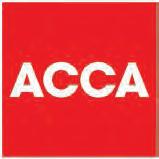

Date: Wednesday 25 October 2023
Venue: Graduate Centre Lecturer Theatre, Queen Mary University of London, Mile End Road, Bethnal Green, London E1 4NS
Time: 18.00 – 20.30 (networking from 17. 30)
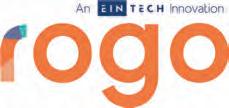

This event is supported by

DAVID ROTHERA

Sharing accounts the way to go
With the appointment of the new Secretary State for Energy Security and Net Zero, Claire Coutinho MP, we hope that fresh vigour and focus will result in urgent, actionable steps to get as many businesses on the road to Net Zero as possible.
It is now widely recognised that urgent action is needed to mitigate the impact of climate change. In this context, accountants have an important role to play in tackling the climate crisis and this is why we launched the Net Zero Accountancy Initiative. We truly believe that accountants can save the world!
Accountants are responsible for tracking and reporting on the financial performance of businesses. This includes tracking their carbon footprint and other environmental impacts. By measuring carbon emissions, accountants can help firms identify areas where they can reduce their environmental impact.
Accountants can also play a crucial role in helping organisations to transition to a low-carbon economy. They can provide financial and strategic advice on how to reduce their carbon emissions, invest in renewable energy, and adopt sustainable business practices. This can include access to green finance and securing funding for sustainable projects. By promoting transparency and accountability in relation to environmental issues, they can help to hold them accountable for their actions and encourage them to take responsibility for their impact on the environment.
We provide all the tools you need to complete your journey to Net Zero and communicate your achievements to your customers, your employees and other key stakeholders. Find out more at www. netzeronow.org/accountants
More than a third (35%) of people with access to a subscription-videoon-demand (SVOD) services are sharing at least one of their subscriptions with others outside of their home, according to Deloitte.
Subscription sharing has also become more formalised, with a quarter of users (25%) sharing the cost of an SVOD platform they use
with other households. This is most prolific among younger users – 34% for 16-24 year-olds and 32% for 25-34 year-olds.
Among respondents who are currently using a service paid for by someone outside their household, the majority (57%) say that they would stop consuming the service if subscription sharing was banned.
Only 15% say that they would take out a new subscription themselves if sharing was banned.
Deloitte partner Paul Lee said: “Since the birth of subscriptionvideo-on-demand, the sharing of user IDs and passwords with other households has been widespread. As SVOD providers look to implement tighter guidelines around sharing to boost subscriber numbers and revenues, consumers are being faced with the choice of paying more, moving to lower-cost ‘with-ads’ packages or foregoing their access altogether.”
Time to get back to the office?
It may seem ironic but Zoom, the video calling app, is the latest big firm to tell staff they need to come back into the office.
Zoom wants staff in at least two days a week at one of its bases. The announcement follows similar moves from the likes of Apple, Amazon, BlackRock and Goldman Sacks.
A Zoom spokesperson said: “We believe that a structured hybrid approach – meaning employees that live near an office need to be onsite two days a week to interact with their teams – is the most

effective for Zoom.”
Oh, and Zoom doesn’t want people in the office more – they
UK fintech investment halved

Total UK fintech investment dropped to $5.9 billion in the first half of 2023, down 57% from $13.8 billion in the same period in 2022, according to KPMG’s Pulse of Fintech report, a bi-annual report on fintech investment trends.
The report said the first six months of 2023 were “quite challenging” for the global fintech market. Some of the challenges
were expected – high levels of inflation, rising interest rates, the ongoing conflict between Russia and Ukraine, depressed valuations and a lack of exits; others were less so, including the collapse of several banks in the US.
John Hallsworth, Client Lead Partner for Banking and Fintech at KPMG UK, said: “Despite a slowdown in UK fintech investment compared to last year, the UK
want them to return to ‘an engagement hub’! It has just opened a new one in London’s Holborn.
remains at the centre of European fintech innovation with British fintechs attracting over half the funding of Europe.”
X
This has all lead to the speculation that next on X’s list is a recruitment service for users. Earlier this year X Corp bought Laskie, a tech recruiting company. The new privacy policy comes into effect on 29 September 2023.
12 PQ the PQ Magazine October 2023 Send your AI assistant to the meeting! It is being reported that Google is ready to give users of its videomeeting software the option to send an AI assistant to meetings. Duet AI will take notes and then present ‘talking points’ on your behalf. Google says the technology is designed to give employees an alternative to cancelling meetings if they have an important work deadline. Some employers, however, might be worried it is another tool for work-shy employees, who will simply use the AI to work for them while they do the shopping. And what would happen if everyone sent their AI assistant to the meeting?
save you 100 hours
AI could save the average UK worker over 100 hours a year. A new report claims this will be the biggest improvement in worker productivity since
introduction of
engine. Google’s Economic Impact Report says unlocking UK’s productivity through AI could boost the economy by £400 billion. And its use in the public sector –primarily in health and education – could also free up an additional £8 billion. The report is a bit hazier about the impact to jobs.
to collect biometric data
formerly
has said it will be collecting biometric data
its
an update
Premium,
face it can also collect your employment and educational history.
AI will
Generative
the
the search
X
X,
known as Twitter,
on
users. In
of its privacy policy for X
on top of photos of your
says it will use this information to “recommend potential jobs for you, to share with potential employers
you
for a
when
apply
job”.
Tech briefs tech news
David Rothera is Climate Project Manager at Net Zero Now
Your planet needs you – now!
Earningindustryrecognisedqualifications fromAATand CIMA enablesyou toupskill fora promotion quickly and efficiently atwork or progress into more senior jobroleswith anew organisation.
Why study yourAAT or CIMA qualifications withe-Careers?
Award-winning training provider
5-star rating on Trustpilot.
Trained over 600,000 students worldwide.
-.. Like-for-like price match guarantee. High pass rates. Experienced Tutors. Additional resources to aid your studies. Tutor support
✓ Live online classes are included. We offer interest-free payment options.
AATPathway aat Approved CIMAPathway ·�CIMA

AATLevels 2 and3
Ideal for those considering a career as on Accounts orFinanceAssistant, Bookkeeper, or Payroll Supervisor. They would also be good choices for professionals looking to start their own business, offering some financial services.

AATLevels4
Suited for those consideringbecoming a qualified Accountant, or interested in senior accounting or financejob roles. It would also suit those individuals who are interested in a career as a VAT or Tax specialist.
CIMACertificate in BusinessAccounting
The entry-pointfor professionals looking to make the progression into business or management accounting. Typicaljobroles at thislevelincludeAccounts Assistant, and Sales LedgerClerk
CIMA Professional Qualifications
These three progressing levels will teachyou all you need to put you on the path to a career as a Finance Manager, Management Consultant, Finance Director, CFO, or CEO
B www.e-careers.com (accounting)
<6 +44 (0) 20 3198 noG Mon -Fri I 9am - 6pm *Trustpilot Excellent l!JrJrJrJfl w IJ ml a @ *
We need to see our exam papers!

First of all, I’d like to thank you guys for this amazing monthly magazine, so interesting and enriching.
I have to agree with the student who said ACCA should allow us to see our exam paper post-marking (Letters, PQ, September 2023).
This is something I have always wanted to happen, and have even tried to raise the issue via ACCA surveys. However, as I expected, ACCA never responded to my request.
I share my fellow students’ frustration; exactly how is a student supposed to know where he/she went wrong if they can’t see how they have been judged?
Yes to feedback
I agree with your letter writer last month that as an ACCA student we pay a huge sum to sit the exam, so we should at least get feedback on where we did well and where we can improve the next time we attend the paper. Otherwise, this just screams ACCA fail people to gain profit.
I also believe we should be able to challenge the marking just how we used to for GCSE or A-Level papers.
Name and email address supplied
I want one too!
I see the AAT has launched a new Student Advisory Group. A great move on their part. Now what about ACCA?
The AAT is an international body and seems to be embracing the idea of hearing genuine feedback. Surely ACCA can pilot a similar project?
Name and email address supplied
AI will be coming for us all
Like you Mr Editor, I am not surprised by the OCED’s report that AI is coming after the work of even the highly skilled staff members with years of education. For years accountants I worked with seemed

We need that feedback in order not to repeat same at the next sitting!
Like many students, it just makes me think ACCA is a purely focused on making money, and this could be the reason why ACCA does not return examination
papers after correction. Meanwhile, for students it means re-doing papers once, twice or even more times before passing.
To cut it short, I would be grateful if PQ magazine could look at a way we could see our papers. After all, they are ours! Name and email address supplied

The Editor says: You are not alone in your request (see below). I know ACCA does lots of surveys and tries to get feedback from students, but then it all sort of disappears. I think it should take a leaf out of the AAT’s book and create a student advisory group. This would give students a real voice and allow for a grown-up debate on such issues.
The announcement of a new CIPFA and ICAEW dual qualification got lots of people talking.

Since 2021 CIPFA and ICAEW have officially been working more closely. As ICAEW CEO Michael Izza said in the press release announcing the fast-track pathway to dual membership: “We have long been of the view that closer working between ICAEW and CIPFA will bring significant strategic benefits for both institutes, which will in turn be good for members and students, the profession and wider society.”
CIPFA boss Rob Whiteman agreed: “I’m confident that going forward we’ll see even stronger partnerships between CIPFA and ICAEW.”
So, the obvious next question for many is when are the two going to move in together?
Back in 2005 a merger was suggested, but it was voted down after an ICAEW membership vote fell short of the necessary majority –by just one percentage point. Some 65.7% of ICAEW members voted in favour of a merger, but it needed 66.7% to go ahead. CIPFA members voted overwhelmingly for a merger.
Then in 2007 the two signed a memorandum of understanding, but that fizzled out.
So, no talk of merger from the bodies themselves, but is it time for another go?

in denial that a smart computer could do a lot of what they did!
AI will become so integrated at work that juniors have to be careful – generative AI is a learning programme and once it has learnt what they can do some firms might ask: why do we need so many juniors anymore?
We still have some way to go,
but as a profession I think we need to understand what the future holds and be ready to change with the wind. Being an accountant is still a great thing to be, and something I have never regretted.
Understanding finance in a wider context is important and using your CPD to keep up with trends is vital.
Name and email address supplied

Some outside the profession are often shocked by the number of accountancy bodies operating in the UK, and many inside the profession believe if there was one main body then they would have a bigger voice. A merger between the ICAEW and CIPFA could be the start of creating a unified profession.

14 PQ PQ Magazine October 2023
PQ Magazin e PO Box 75983, London E11 9GS | Phone: 07765 386489 | Email: graham@pqmagazine.com Website: www.pqmagazine.com | Editor/publisher: Graham Hambly graham@pqmagazine.com | Associate editor: Adam Riches | Art editor: Tim Parker Contributors: Robert Bruce, Prem Sikka, Lisa Nelson, Ann a Kat e Phelan, Tony Kelly, Phil Gammon, Edward Netherton | Subscriptions: subscriptions@pqmagazine.com | Origination services by Classified Central Media If you have any problems with delivery, or if you want to change your delivery address, please email admin@pqmagazine.com Published by PQ Publishing Ltd © PQ Publishing 2023
email graham@pqmagazine.com
Our star letter writer wins a fantastic ‘I love PQ’ mug!












The CGMA Finance Leadership Program (CGMA FLP) is a digital-first learning and assessment platform that lets you get the globally recognised CGMA designation anytime, anywhere and at your pace. With the CGMA FLP, you can fit your learning to your schedule, sit with less formal exams and uncover a new realm of career possibilities upon completion. Find out more at aicpa-cima.com/flp. Founded by AICPA® and CIMA®, the Association of International Certified Professional Accountants® powers leaders in accounting and finance around the globe. © 2023 Association of International Certified Professional Accountants. All rights reserved. 2307-444079 Take the next step in your career with the CGMA® Finance Leadership Program. CFOs FUTURE WANTED
Last-minute tips for case study exam success
With the right approach and mindset, exam success is well within your reach, says Nasheen Wuisman
from examiners and students to optimise your planning for the case study exam.
Prioritise key concepts and topics
Focus on critical topics that are frequently examined in case study exams.
Revisit the core concepts and materials you have already studied rather than delving into new topics. At this late stage, attempting to learn entirely new content may lead to confusion and prevent effective retention.
Self-care for the right mindset
A well-rested mind performs better, so try to avoid pulling an all-nighter before the exam. After a good night’s rest, you’re more likely to retain information efficiently and demonstrate critical-thinking abilities.
As the exam day approaches, it’s natural to feel nervous. You’ve studied and worked hard, and the pressure is on. To combat the nerves, try relaxation techniques such as deep breathing, meditation, or light exercise to help keep anxiety in check.
Your next case study exam
As you prepare to take the next case study exam, adopt a structured approach and plan your study process in stages to ensure a comprehensive and efficient review.
The case study exams are critical milestones in your journey to achieving the Chartered Global Management Accountant (CGMA) designation.
As the exam date approaches, you might feel a mix of excitement and nervousness.
In the final 48 to 24 hours before the case study exam, work to reinforce your existing knowledge rather than trying to cram new topics. To set yourself up for success, focus on demonstrating your skills, prioritising key concepts and maintaining a confident and wellrested mindset.
A strategic approach during this critical period will maximise your chances of achieving a positive outcome in the exam.
Demonstrate your skills
The examiner wants to see you demonstrate your skills in the exam. It’s crucial that you can apply your theoretical understanding of key concepts and showcase practical problemsolving.
Focus on the following skills:
• Application: Before the exam, ensure that you know how to structure your answers to show the examiner that you can apply technical knowledge in practical situations.

Demonstrate that you are business aware
by practicing these application skills, so they become second nature.
• Answer planning: Although you have already familiarised yourself with the preseen, reading it over the day before the exam will keep the content fresh in your mind. That way, when you get the unseen on exam day, you’ll be prepared to link the information together and make brief notes in response to the task. This approach lets you jot down your ideas as they arise, ensuring you capture your thoughts in real time. Developing an answer plan during the exam will empower you to present your response effectively.
• Time management: Although the pressure of exam day can make it challenging, good time management during the exam is crucial to success. Integrate timed question practise into your study routine. As the exam date approaches, take the time to establish your comfort level with the allocation of minutes per mark. This ensures that you know the time required for each task so you can manage and adhere to your time allocation effectively. For more insight on case study exam preparation, explore The Little Book of Secrets from AICPA & CIMA, filled with practical tips
A well-structured study plan builds your expertise and instils a sense of preparedness that will be a powerful asset during the case study exam.
Consolidate your technical knowledge and focus on core accounting and management principles relevant to the exam. Once you’ve grasped the fundamentals, use them to analyse the pre-seen material. Familiarise yourself with the key stakeholders, businesses and intricacies of the scenario to gain a deeper contextual understanding.
Regularly integrate mock exams into your study routine. Practising with realistic case study scenarios allows you to hone your problem-solving skills, develop effective strategies, and gauge your progress.
In the final days leading up to the exam, focus your revision on crucial areas that require reinforcement. By keeping these essential concepts fresh in your mind, you can approach the exam day with confidence and clarity.
The CGMA Study Hub offers various free resources and study support. You’ve got a team of professionals working to help you reach your educational goals and find your dream job.
• Nasheen Wuisman, Senior Manager of Global Academic Progression at AICPA & CIMA, together as the Association of International Certified Professional Accountants
16 PQ PQ Magazine October 2023 CIMA spotlight









–▪ ▪ ▪ ‘live online’ –▪ Scheduled ‘live online’ –▪
September exam feedback
Were the ACCA exams a piece of cake? Here’s what those sitting the September exams thought of them…

SBL
Despite it being in the June exam some sitters were surprised to see culture come up again.
One sitter said: “The pre-seen was largely redundant in use, other than to give you a feel for the industry.” They also felt the exam required very little syllabus knowledge, but were worried because it did not feel challenging in any way.
Disruptive technology came up, but some felt all the answers were in the extract. Student struggled here, and many felt they were repeating themselves.
Unfortunately, we read that one student had prepared for a four-hour exam! Surely there are no excuses for not knowing about the changes.
AAA
Not many complaints about the AAA examiners – but the sudden hot weather in the UK and lack of air conditioning at some venues were a shock to some.
As one sitter said: “Exam was OK. I had group audit for 50 marks, forensic audit for 25 and final accounts sign off (material misstatement) 25 marks.”
Others had due diligence, redundancy and PPE.
AA
Many sitters thought September’s AA exam was OK. Some of the MCQ were ‘a bit difficult’ and even ‘tricky’, but section B was deemed ‘fine’.
As the exam wasn’t too bad many sitters are now worried that they found it too straightforward!
However, one PQ felt that the whole paper ‘horribly imbalanced’. Where, they asked, were the questions on review and reporting, ethics, and threats? Most of their paper was just substantive procedures and audit risk. They could not even get away from substantive procedures in the MCQs.
TX
Bit of a mixed review from students. As one PQ said: “Section A and section B was really tough, but section C wasn’t too bad.” Another said: “Personally found section C quite hard.”
Just over half (53%) of those registering their opinion on the Open Tuition Instant Poll said the exam was OK, with 29% saying it was hard, and a further 14% had a disaster.
PM
Many said they found this September’s PM a hard one. As another sitter said: “Section C, the first question was hard. Even some of the MCQs were tricky. I feel like all the worst little topics came up.”
A fellow sufferer agreed: “Terrible paper this morning – they picked three of my worst subjects!”
‘Awkward’, ‘tricky’ and ‘very tough’ were descriptions used a lot in Facebook groups. The exam was another hard test, according to the Open Tuition Instant Poll. Some 22% described
the September sitting as a disaster, and 43% said they found it hard. Just 32% said the exam was OK.
FR
Section B was not a favourite for many sitting September’s FR exam. However, this was offset with a much better section C. As one sitter explained: “Sections A and B were pretty brutal, but section C was rather nice.”
Another sitter agreed: “My section C was easy compared to what I was expecting.”
The Open Tuition Instant Poll saw 58% calling the exam OK, 24% said it was hard and 12% felt it was a disaster.
FM
Not the worst ever FM exam, yet one sitter felt it wasn’t the nicest of paper either: “I found section B particularly hard, section C I just had standard NPV and working capital ratios, which surprised me!”
In the Open Tuition Instant Poll some 6% said the exam was easy and another 46% felt it was OK. Just 12% called it a disaster.
SBR
“Dreadful, found it extremely hard” and “tough exam with very few calculations” were some of the comments about September’s SBR exam.
The question on hedging was particularly hard, and many admitted they found it difficult.
The Open Tuition Instant Poll had nearly one in four (24%) ticking the disaster box, and another 39% found the exam hard. A third (35%) said it was OK.
ATX
“Pretty happy” and “a reasonable set of questions”, with “nothing too niche or attempts to trip you up”. That is how some described this September’s ATX sitting.
One PQ admits they finished the exam 40 minutes early. We particularly like the student who said: “Question paper was really easy, but the answers seemed difficult!”
In the Open Tuition Instant Poll 16% of sitters said the exam was a disaster and 37% found it hard. Some 40% said it was OK.
APM
“Nice, with nothing too nasty,” is how one sitter described APM this time around. Another sitter explained: “I feel quite confident about APM this morning. All the questions were absolutely manageable, nothing too tricky.”
Yet another seemed shocked and simply said: “All OK, can’t complain!”
So, more decent subjects and formulas this time, compared with June.
AFM
“AFM is no joke,” is how one sitter put it! Another agreed: “Worst paper I have ever done.”
Hedging, mergers and ACQ, and some ratio analysis, was the test for some.
In the Open Tuition Instant Poll 32% of sitters voted the exam a disaster, with another 41% saying it was hard. Just 23% said the exam was OK.
18 PQ PQ Magazine October 2023 ACCA exam feedback




















Developed with accountants in mind. Visit getrogo.com for your free trial Accurate replications of questions from ACCA, AAT, CIMA, ICAEW & ICB. Discover fully-functioning spreadsheet features for your accountancy training. Discover Rogo.















Become an Intermediate Financial Accountant Unlock you career potential with the IFA Graduates, recently qualified and part qualified accountants get the support, guidance and recognition you need to set yourself apart in a competitive SME job market with: • Designatory letters IFA AIPA • Access to a variety of technical resources • Relevant CPD webinars and networking meetings • Financial Accountant, our member magazine • MyCommunity, our online member space • A weekly enewsletter covering accounting, finance and business FIND OUT MORE at IFA.ORG.UK/ROUTESIFA
Celebrating 250 issues
Our October issue marks a milestone for PQ magazine – our 250th edition!
It has been an amazing journey and everyone at PQ magazine is proud to say this is our 250th issue!
We have loved every minute of it, and hope that we have been a guiding light at your side as you move from PQ to NQ. We have challenged the profession to change and pushed for that change. We believe just being around so long has meant we are also taken seriously! But we thought now is not the time to blow our own trumpet. Instead, we thought we would let other people do that:
first saw PQ magazine. So much has changed in our world through corporate crises, regulatory change, digitisation, Brexit and war. But PQ has remained consistent and valuable.
“At the start, PQ met a need for a free-thinking publication which supported accountancy students. It has never deviated from that –it provides vital communication, holds the examining bodies to account and builds student capabilities.
“Graham, you and your team have done a great job. We have not always agreed, but you have always been a critical friend. Long may that continue.”
many congratulations to PQ on reaching its 250th issue. The magazine provides invaluable insights and news for trainees and newly qualifieds, so here’s to the next 250!”
has campaigned on issues of tax transparency, representation of minorities, a better deal for students and much more. All this is due to the extraordinary efforts and vision of Graham Hambly, founder of PQ magazine. It has been a privilege and an honour to work with Graham over the past 250 editions and I look forward to next 250. The Beatles song will need to be rewritten.”
Helen Brand, Chief Executive, ACCA: “ACCA warmly congratulates PQ on its 250th issue. It is an amazing milestone and throughout that journey PQ has done nothing but champion the interests of students and newly qualifieds from all bodies, including of course ACCA. Here’s to the next 250 issues.”
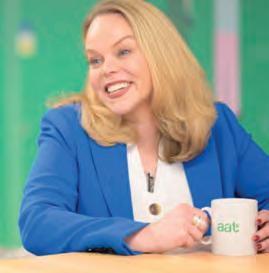

Sarah
“Congratulations to PQ magazine on your 250th issue. This is a real milestone achievement, showing just how valued the magazine is among students for its high-quality content and details of what’s happening in the accountancy world, as well as tips, advice and support to help them complete their qualifications and go on to successful careers in the accountancy profession. We’re delighted to have worked closely with you on this over the years and hope to continue to do so well into the future. Here’s to the next 250!”
Phil Turnbull, Chief Executive, Association of International Accountants: “250 editions of excellence, knowledge, and inspiration – a true testament to PQ’s unwavering commitment to inform, educate and hold the accountancy industry to account. Personally, working with Graham over the past two decades has been an absolute privilege and I wish a wholehearted congratulations on this remarkable milestone! In an ever-evolving media landscape, your enduring presence speaks volumes about your resilience and ability to embrace change while staying true to your core values.”
Professor Richard Murphy, Professor of Accounting Practice, Sheffield University Management School: “UK business could not function without the work done by the UK’s PQs. It is they who keep this country’s cash flowing. PQ magazine has supported these vital people in all stages of their careers over 250 issues and plays an absolutely essential role within the accounting profession as a result. Long may it continue.”

Andrew Harding, Chief Executive – Management Accounting, AICPA & CIMA: “Congratulations on reaching the 250 issues milestone! I remember the first edition so well, those of us around at that time will all be delighted with the success you have achieved. I can’t believe that it is now 20 years since we



Prem Sikka, member of UK House of Lords: “Will you still need me, Will you still feed me, When I’m sixtyfour’, is a famous line from a 1960s hit song by the Beatles. Well, PQ Magazine has done far better. It has hit its 250th edition and we still love it and need it. Right from the first edition, PQ has been a champion of students and has given them a voice. It regularly calls professional accountancy bodies to account. It
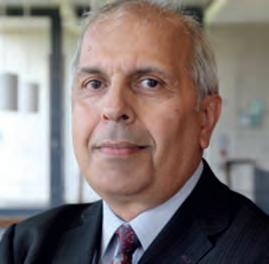
Professor Atul K Shah, City University of London: “PQ magazine has been a very rare and influential student voice in accounting for decades. Given the millions of students globally studying for the profession it is vital that young people are engaged and supported in their professional journey. Regular columns by influencers like Professor Prem Sikka have helped
Continued on page 22

21
Magazine
2023
250
PQ
PQ
October
PQ –
issues young
Beale, Chief Executive, AAT:
Rob Whiteman, Chief Executive, CIPFA: “From everyone at CIPFA,
students understand the wider impact of accounting practices on the economy and society, sadly often leading to greater inequality and audit failures. It is so critical that students are able to see accounting beyond the textbook and understand how important it is to protecting public interest and what difference an ethical professional can make in wider society.”
Mark Ingram, Director of FMELearnOnline: “PQ focuses on ‘critical issues’ – whether it’s the accounting career attrition rates, social mobility, climate change, blockchain, ethics or AI, you’ll find it discussed in PQ. There are expert columns from some of the top ‘thought leaders’ of the accounting world, too.

“For me though, the real ‘meat’ of PQ is the issues it adopts and pushes – which frequently lead to real change. This is PQ ‘holding power to account’ (where’s the IFRS on this?). As PQ says: “We go where others fear to tread. We pride ourselves on our independent approach, seeking out the stories that matter.” Whether that’s exam fiascos, pass rates, well-being or pay levels, PQ is pushing for change – and attempting to get us to help ourselves.
“Like many ‘institutions’, and after 250 editions it is an institution, it is fragile. PQ doesn't always gain the support it should from the powerful. I guess it takes integrity to understand that having a ‘critical friend’ is more important long term than maximising your SEO score.”
Stuart Pedley-Smith, Head of Learning, Kaplan: “Becoming a qualified accountant is certainly not easy, it requires determination, hard work and support from tuition providers, employers, professional bodies, friends and family. But there is also a need to feel part of a community, a group of people effectively studying together, different subjects of course, but all facing similar challenges and asking similar questions. These can range from not understanding a specific topic, wanting to know how to study more effectively, to finding out what is happening in the sector. For 250 editions
PQ has provided this service for accountancy students. It has also been the voice of the student, shining a light on areas that are of concern and when required holding to account those of us who work in accountancy education.”
First Intuition: “I am old enough to remember Graham setting up PQ magazine. He wanted something that represented and supported students, that held institutes to account, that was fun but with a core of useful information in every issue. I think that over 20 years and 250 issues it is a testament to Graham and the team that they managed this and continue to. I know it is a tireless job to keep being able to bring relevant and up-to-date information to students, but the PQ team continue to do this. Well done to everyone involved over the years, a fantastic achievement!”
• I love PQ because it represents students’ interests, and holds the professional bodies to account.
• I love PQ because it publishes free useful, interesting and quirky content for students.
• I love PQ because of the PQ annual awards which celebrates our industry.”
Regwana Uddin, LSBF ACCA tutor, PQ award winner 2021: “PQ magazine was my source of news in the accounting world when I was a student. I was a mere 21 years old when I started studying ACCA, and my tutors would all recommend subscribing to PQ magazine straight away!
“I looked forward to the exam tips, news on the Big 4 firms and reading about an accountant’s typical day.
“Now that I am an ACCA tutor myself, I recommend the magazine to all of my students, especially the articles on mental health, positive thought processes and general well-being.
“Thank you PQ magazine, for giving me a telescope into the accounting world.”
Sunil Bhandari, ACCA AFM online tutor, PQ award winner 2020: “Personally, I want to say a big thank to Graham the editor and PQ magazine. When I set up my online courses nearly 10 years ago, I was very much a lone wolf in a market full of the big colleges. However, you were one of a very few people who helped and supported me, and I have never and will never forget that.

“From those beginnings FME Learn Online developed into what it is today, and I work with a great team of colleagues. I am a member of the pack and no longer that lone wolf.
Umar Tariq, Senior Training Consultant. FC Training: “I want to extend our heartfelt congratulations on you reaching this remarkable milestone. This achievement not only speaks to the magazine’s dedication to excellence but also to its unwavering commitment to delivering top-notch content to its readers.
“PQ magazine has been an invaluable resource in the field of accounting and finance, providing insightful articles, industry updates and professional guidance to students and professionals alike. The magazine’s consistent quality and relevant content have truly set it apart as a leader in its domain.”
magazine!
“I was also truly honoured to get my PQ Editor’s Award in 2020 which still sits proudly in my office.”
PQ magazine, January 2003
Sean Purcell, ACCA SBL online tutor, PQ award winner 2020: “Most people experience PQ magazine for a short window while preparing for their accountancy
The first-ever issue of PQ magazine was published in January 2003, and apart from the editor, the other two constants have been award-winning journalist Robert Bruce and a certain Lord Sikka (pictured).
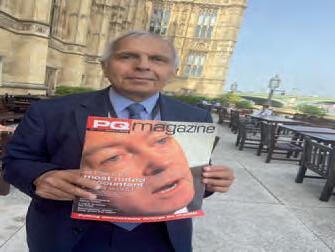
Sir David Tweedie, the chair of the International Standards Board, was our cover ‘star’, along with the headline: “Is this the most hated accountant in the world?”

While many things have changed in the profession over the past 20 years, some things remain constant. We had a feature on what CIMA examiners want and feedback from the December 2002 ACCA exams.
In the news there was anger over ICAEW exam centre closures in Guernsey, Sheffield and Leicester; we announced CIPFA was the first body to have a permanent student member sitting on council; and we reported on the ACCA leaving the net present value tables out of the 2.4 exam paper.
Our tech news section was called IT news, but it was still there.
22 PQ PQ Magazine October 2023 PQ – 250 issues young
Martin Taylor, CEO and chairman
Tom Clendon, ACCA SBR online tutor, PQ award winner 2011 and 2023: “Three reasons why I love PQ
Among our advertisers were Foulks Lynch, LCA, LVMT and Jeff Wooler College. None of these are offering ACCA training today, and some don’t even exist.
Continued from page 21
On our fun page we ran a story of a secretary at American Express HQ in Brighton who was sacked for sending an invitation to a sexy party to the company’s FD. It was supposed to go to a friend. Seemed a bit harsh, even at the time!
PQ magazine, August 2019
In our 200th issue, in August 2019, we revealed over half (56%) of PQs told us in our ground-breaking mental well-being survey that the exam process had left them in tears. When we asked whether their accountancy body should be doing more to safeguard students’ wellbeing some 68% of respondents said ‘yes’. It was part of our massive campaign to make the accountancy bodies take mental well-being seriously.
In other news we reported on AAT salaries, with the average UK wage jumping to £29,000. That was up 8% in two years. In a story that seems to keep coming around, we revealed large numbers of KPMG US audit professionals had cheated on internal training exams, and Furhat Robotics unveiled a new recruitment robot called Tengal.
Among our features we were ‘auditing a sausage’ and looking at CIMA’s new syllabus changes. We also reported from the ACCA Lecturers’ conference.
exams. As someone involved in helping students to be successful in their exams for nearly 30 years, I have known PQ magazine since its inception.
“I’d like to say thank you PQ, thank you Graham Hambly, for being the champion of the little person, and by the little person I mean the student.
“Whenever a professional body has stepped out of line or a student has been unfairly disadvantaged by something, causing distress, you can rely on Graham to step in on their behalf using the power of PQ and solve their problems. I’ve seen it time and time again and many students are indebted to PQ.”
Tony Margaritelli, MD at HMRC Enquires, Investigations and Powers e-magazine: “A huge part of my early career was training and helping our firm’s intake train and pass their exams and I always made sure they registered for the magazine. When I used to hold meetings with them, I would ask them questions that had been covered in the most recent issue.
“Now those days are gone but I still try to repost content on social media whenever possible, always ending with the same sentence that I used all those years ago: “Get a subscription, it’s free and it will help you pass”. Nothing has happened over the 250 issues to make me change my mind, except that I think it’s getting better and better, with more depth and insight and
yes more tips and wrinkles to help pass.”
All this while focusing on the singular and laudable aim to put the student first. Here's to another 250 editions.”
Harri Dhillon, co-Chief Executive at e-Careers: “We encourage all our students to sign up to PQ magazine. With its comprehensive coverage of the latest developments in accounting and finance, it continues to equip our students with a wealth of invaluable insights and knowledge that prepares them for success in their professional careers.”
Will Holt, FCA, ICAEW Managing Director, Education and Training: “I would like to congratulate PQ magazine on reaching this significant milestone. It provides ACA students with crucial insights into everything that matters to the profession – from the latest sustainability standards to exam top tips.

“The accountancy world has changed significantly since the first edition of PQ in 2003, with the rise in new training technologies, new regulatory requirements and technological advances. I’m certain that PQ will continue to be at the forefront of providing guidance and information to accountants, and I look forward to another 250 editions.”
Clare Finch, partner HTFT Partnership: “PQ magazine really is
more than just another magazine. For those of us who made accountancy training a career and for those going through their journey to become newly qualified it is the 'go to' place to know what is going on in the wider world of accountancy.
“PQ has its finger on the pulse of the latest news which includes changes to qualifications, changes to accounting standards and exam tips and feedback. It is a goldmine of inspiration, featuring student stories, aspiration, with great careers advice and information across all the accountancy qualifications.
“Graham Hambly, the editor and publisher of the magazine, is always a pleasure to spend time with, and runs the best industry awards each year!”
Polly Thrasivoulou, Head of members services, ICB: “PQ has always championed the student, regardless of the qualification they are studying. The magazine has been a constant in students' lives and mine! Well done for reaching such a milestone, I know you couldn’t have done it without me.”
• We have been forced to edit many of the quotes because some were so long! Thanks for all the kind words, and they will appear in full on the website… and if you want to add your two pennies’ worth then email graham@pqmagazine.com
PQ magazine, May 2011
Gareth John, First Intuition and PQ magazine award winner: “Graham has been a great supporter of the accountancy sector for longer than I now care to remember. He genuinely has the interests of accountancy students and their employers at heart and is not afraid to raise difficult questions with the awarding bodies.”
Robert Sowerby, consultant and professional accountancy tutor: “How long? Graham you have certainly been on a journey. At PQ you have been a part of the firmament for so long that you have a perspective that many miss. PQ has retained its mix of reportage, fun and campaigning journalism through the trials and tribulations of the magazine industry. Further, it has spawned the awards, conferences and created a significant online space.
PQ magazine turned 100 in May 2011 and to celebrate we gave away over 100 free courses.

Our lead story that month focused on the major difficulties AAT was having with its CBA exams (sound familiar?). March students had experienced frozen screens, while others were losing whole parts of their answers.
We also reported that audit firms’ ‘complacency’ and ‘dereliction of duty’ had contributed to the finance crisis, according to a House of Lords’ Economic Affairs Committee Report.

Meanwhile, ACCA students were told to start revision earlier by a leading examiner, and we looked at Islamic finance. There was also concern about the misuse of ACCAmail by unscrupulous traders. It appeared that anyone could set up an account – you didn’t even need to be an ACCA student. We stopped that!
It was also ACCA examiners’ confernce time and we gave out top tips for the CIMA exams.
PQ 23 PQ Magazine October 2023
PQ – 250 issues young
Thank you, PQ!

The 250th issue! Well, where has the time gone, asks Karen Groves
Rather than the usual monthly accountancy article, I wanted to thank PQ for how much their magazines have helped me with my studies over many years.
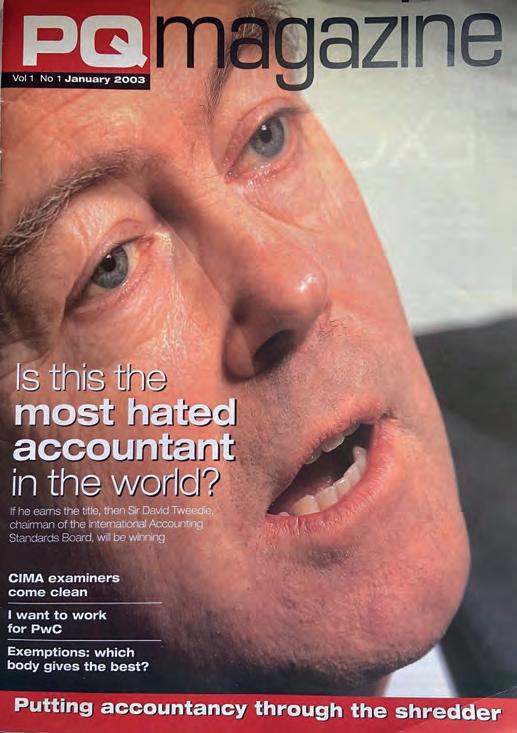
As an AAT student at college (a long time ago!), I remember our lecturer copying useful articles from the PQ magazine and handing them to us to help with revision. These articles didn't just help us with our AAT studies, but are also an invaluable teaching resource, with articles written by some of the best tutors in the industry.
As I progressed to my ACCA studies, I kept a very close eye on the exam tips, always attached with the usual ‘health warning’! These were helpful as they let me quickly check that I was happy with all the topics raised. Then came the student feedback on the actual exams, and the results followed. It was always reassuring to know that while I was sulking about not being much over pass marks at times, other students had found some unit exams equally as challenging – so I shouldn't have been too hard on myself!

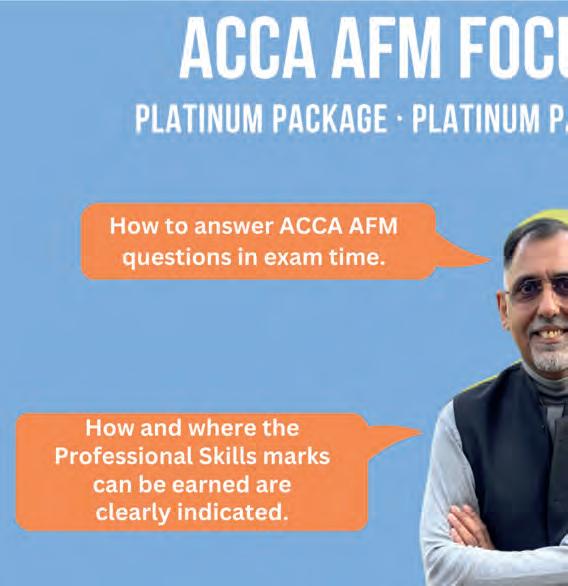
Then we have the CPD aspect, where reading the PQ magazine enables us to log some much-needed CPD hours – a big win! Not only are you reading articles that keep you up-to-date with changes, for example IAS/IFRS, but you can also bank the hours spent reading the articles.
So, I would like to say a huge thank you to Graham Hambly and the team at PQ magazine, from not just us as tutors but also students, as the magazine is great to read to help with studies, regardless of the accountancy qualification route you have chosen, and includes the latest updates in the news and workplace. Thank you all, and I hope you are having a party to celebrate!
• Karen Groves is
an
AAT tutor and Faculty Director of Accounting at e-Careers
PQ 24 PQ Magazine October 2023 PQ – 250 years young
AAT: What level should I start at?

Identify the right AAT qualication for you with Premier Training’s Skills Checks.
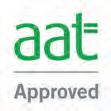
Your free online Skills Check is automatically sent to a Premier Training tutor who will contact you on which AAT level to study rst. Head to our website at www.premiertraining.co.uk for more details.

You can start AAT distance learning courses on any day and t your studies around your job and other commitments.
Interest-free instalment plans are available for all courses as well as FREE Xero training and certication.
Get Started Today
Start your studies the same day24 hour online access with instant access to tutor support.
Learning Resources
Award winning learning resources including printed books, eBooks & e-learning, videos and quizzes.

Assignments

Prompt marking turnaround –marked by a tutor (not a computer).
Xero Advisor Certication

Premier Training has teamed up with Xero and is pleased to offer the Xero Advisor Certication Equivalency Course FREE OF CHARGE to anyone who enrols.
01469 515444 AAT Distance Learning AAT Distance
info@premiertraining.co.uk
Two is better than one

A new accelerated route to gain CPFA and ACA qualifications will deliver better career opportunities for CIPFA and ICAEW students, says Anna Howard


We’re living in an ever-changing world. Economic difficulty and political turmoil have had a negative impact in many countries across the globe. This in turn puts a lot of pressure on finance professionals in all industries, whether that’s the public or private sector. That’s why we need skilled and well-rounded candidates, who are driven, dedicated and passionate.
We also see the private and public sectors becoming increasingly interdependent. The global context within which accountancy, public finance, business and commerce now operate is a challenge that demands more from institutes such as CIPFA, as well as putting ever more demands on finance professionals.
At CIPFA, we are dedicated to providing the best possible career options for our students, which is why we are proud to announce our new accelerated route to gain CPFA and ACA designation and dual membership with ICAEW. As part of this, students now have the option to gain both CPFA and ACA designations and a member of both institutes.
To do so, newly qualified CPFA members will

be able to take an additional module, Corporate Reporting, and complete a statement of intent. This will enable newly qualified CIPFA members to apply for ICAEW membership and use the ACA designation in addition to the CPFA designation.
Similarly, newly qualified ACA members will also be able to gain CPFA designation with an additional CIPFA module, Public Sector Financial Reporting. This will mean that choosing to study a CPFA qualification does not limit your career options to the public sector for the first five years.

This exciting development will provide greater flexibility and a wider range of career opportunities for our newly qualified CPFA accountants. In addition, the accelerated route to gain CPFA and ACA designation and dual membership will also make students much
more attractive to potential employers, as they will possess the well-rounded knowledge finance professionals need today. We also hope this will encourage more ACA qualified accountants to move across into the public sector and experience all the rewarding challenges the sector has to offer. By pooling our resources and online support for students and members, we are confident that together we can deliver better outcomes for them and the accountancy profession as a whole.
The accelerated route to gain CPFA and ACA designation and dual membership will be launched early in 2024. If you would like to register your interest or receive further information email hello@cipfa.org
• Anna Howard is head of qualifications and membership at CIPFA



26 PQ PQ Magazine October 2023 CIPFA/ICAEW tie-up
DISCOVER THE FUTURE WITH ACCA’S CAREER NAVIGATOR Wherever you are on your journey, our navigator guides your route – acquire new skills, explore career destinations and opportunities and grow your talent. Visit careernavigator.accaglobal.com
Self employed cash basis made simple
In this month’s article in his ‘Keep it Simple’ series, Neil Da Costa tackles an area where examiners say students struggle with
In this article I will be showing you how to deal with questions on the simplified selfemployed cash basis.
Self-employed individuals (sole traders and partnerships) can choose to prepare their accounts on a cash basis as long as their turnover is not more than £150,000 a year. This will allow the business to prepare accounts based on cash received and expenses paid instead of the accruals basis. Under the cash basis, capital expenditure except for cars is treated as revenue expenditure.
The business must leave the scheme once the annual turnover exceeds £300,000.

Simple example: Candy’s Sweet Jabs Candy is self-employed and runs her own Botox studio called ‘Candy’s Sweet Jabs’, giving her clients their sweet, youthful looks back. She has an annual turnover of £120,000 and has spent £20,000 on beauty equipment. Explain whether Candy is allowed to join the cash scheme and the implications of doing so. What would the advantages and disadvantages for Candy joining the scheme?

Candy’s Sweet Jabs
Candy has a self-employed business with an annual turnover of less than £150,000 so is permitted to join the cash accounting scheme. This will allow Candy to prepare accounts on the basis of cash receipts and payments. Candy is allowed to treat the beauty equipment as a revenue expense and get a tax deduction for it.
The advantages are that the accounting is much simpler, and Candy will not have to account for inventory, payables and receivables. In addition, profit will only be accounted for when realised which will give her more time to pay the tax.
The disadvantage is that if Candy makes a trading loss under the cash basis, she would only be allowed to carry forward the loss against future trading profits of the same trade.
Under the accruals basis, Candy can also offset the loss against other income in the current and previous tax years.
Flat rate expense deduction
Any self-employed business can choose to use the flat rate deduction for motor expenses and use the approved mileage rates of 45p a mile for the first 10,000 miles and 25p thereafter.
In addition, where there is private use of a commercial building in relation to utilities there is a flat rate adjustment disallowed based on the number of occupants.
Brandi’s Bed and Breakfast
Brandi has a bed-and-breakfast business and has prepared accounts for eight months. Brandi and her partner also live in the property.
Brandi has bought a car for £10,000 (CO2 emissions 40g/ km) and incurred motor expenses of £5,000. Brandi used the car for 70% business purposes and drove 11,000 business miles.
Brandi incurred expenses of food, utilities, and household goods of £16,000 out of which £5,500 relates to private use.
The private use adjustment for two occupants in a business premises for 8 months is £4,000.
Explain the implications if Brandi computes her accounts under the usual basis and if she opts for the flat rate expense deduction.
Solution: Brandi’s Bed and Breakfast
Option 1: normal basis
The car would be eligible for capital allowances of 18% and this would be time apportioned by 8/12.
The capital allowances available are £10,000 x 18% x 8/12= £1,200 x 70% = £840.
The allowable motor expenses are £5,000 x 70% = £3,500.
Brandi can also deduct the food, utilities and household goods incurred for business purposes of £16,000-£5,500 = £10,500.
Option 2: flat rate deduction
No capital allowances are available on the car. Instead of deducting the motor expenses, Brandi can deduct an amount based on the business mileage of 11,000 miles.
(10,000 x 45p = £4,500) + (1,000 x 25p = £250) = £4,750
Brandi can also deduct the food, utilities and household goods but must adjust for the private use adjustment of £4,000.
£16,000-£4,000 = £12,000.
Exam Assumption
In the tax exams, you can assume that if the cash basis is chosen, the flat rate expense deduction automatically applies to both motor expenses and utilities.
You have now understood the self-employed cash basis and can easily earn marks on this popular exam topic.
• Neil Da Costa is a Senior Tax Lecturer with Kaplan in London. He is the author of Advanced Tax Condensed and Tax Condensed, which summarise the entire syllabus using memory joggers.
PQ 27 PQ Magazine October 2023 advanced tax
mindful-education.co.uk/students Flexible learning to suit your lifestyle
Award-winning AAT courses and apprenticeships
Three steps to heaven
Dorothy Wood shares three simple steps to success in your first accountancy exam

Taking your first professional accountancy exam can be a nerve-wracking experience. However, there are simple steps that you can take to set yourself up for success in your first – and future – exams.
1. Book your exam as soon as possible: Whether your first exam is on-demand or session-based that takes place in a specific week of the year, making a solid commitment to the exam focuses the mind and motivates you to put in the learning and revision hours required. While some students will have their exams booked directly by their employer many do so themselves and it’s important to take this first step.
Whether you’re studying with a learning partner or on your own, planning your time is crucial to exam success. ACCA has its own ‘Compass’ exam planning tool that allows you identify your exam goals for the next year as well as build detailed study plans for specific exams.


2. Be prepared – get to know your exam format and available study resources: Get to know your exam. Review the specimen exam to understand its format and length. What


type of questions will you have to answer – will it be objective test questions, longer written answers in a word processor or on a spreadsheet, or a combination of these?
At ACCA we have a range of study support resources to help you plan, learn and prepare for exam success for all our exams:
• For exam planning we have the ‘Compass’ exam planning tool.
• For learning and revision we have the ACCA Study Hub

• For exam question practice and mock exams we have the Practice Platform
(Applied Skills and Strategic Professional exams) and Practice Tests (Foundation and Applied Knowledge exams).
3. Practise, practise, practise: Question practice is a key part of any final exam preparation; however, it should be a key element of your learning routine as well. Attempting questions during and following a period of studying will help embed your knowledge and give you confidence that you have understood what you have learned. For example, the ACCA Study Hub has a mini-quiz at the end of each chapter which is fun to do. There is also a larger bank of practice and revision questions to further aid your knowledge building and exam revision. The Practice Platform and Practice Tests then allow you to take full mock exams to enable you to prepare fully for your real exam.
Taking your first accountancy exam can be daunting, but if you follow the tips and advice above you are off to a great start. I have used ACCA specific examples, but I hope the advice will resonate with all accountancy students.
• Dorothy Wood, head of education relationships, ACCA
28 PQ PQ Magazine October 2023 ACCA spotlight
Your
study
Study Hub is our new digital platform, giving you access to study materials from ACCA. Used together with tuition, it helps you to be better prepared for your exams and increase your chances of success. Study anytime, anywhere with resources that build your knowledge and increase your understanding. Explore Study Hub today. #ACCAStudyHub www.accaglobal.com/studyhub
perfect
partner.
Excited or daunted?
Cath Littler shares her three steps to success for those embarking on a new phase of their accountancy training
Starting a new course or programme of study is always exciting, but also a bit daunting. The excitement is because of the new challenge or the expectation of career progression, the daunted bit comes when you look at just how much work you will have to put into your studies.
Even if you have recently studied it is likely that either the subject is new or that you are moving up a level, say from Level 2 to Level 3, so you will want to be as prepared as possible.
Manageable study sessions
The first thing to consider is your study time. How much time per week do you need
to allocate to study? How will you split it up into manageable study sessions? How much extra time will you want for exam preparation? Everyone is different, but a Level 2 AAT student may need six hours a week, doubling that by the time they reach Level 4.
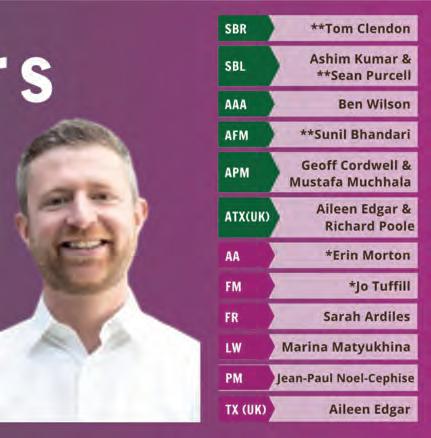
The duration of your study sessions should be shorter for lower levels, only an hour or two at a time for Level 2, becoming longer as you study more complex material. Remember also that Level 2 is equivalent to GCSEs, Level 3 is A levels and Level 4 is university level study,
so the degree of difficulty jumps significantly between levels.




The amount of time you will need to devote to exam preparation will depend on how effectively you study the unit as a whole. Learners who ensure that they understand each chunk of study as they go, will find assessment preparation easier than those who say to themselves ‘I’ll pick it up in revision’ – a recipe for lower-than-expected exam marks!
Studying effectively
Having planned when you are going to study (and where), you now need to consider how you are going to study. Turning up to lessons and/or following a set programme of study provided by your training provider seems obvious, but how are you going to make the most of what has been provided?
There has been a lot of hype in the past about whether someone might be an auditory, visual or kinaesthetic learner, but that concept has been long discredited in research literature. What research is saying to us is that to learn effectively you must actively engage. So how do we do that? Well, there are three surefire winners that we can do:
• Take notes when listening, reading or watching videos and build your own textbook based on your notes and example calculations shown.
• Attempt all practice questions without looking at or revealing the answers. If you are not sure what the answer is or how to do the question, study your notes until you find some help, or ask your teacher if you have one. If you do genuinely try the question (rather than just guessing) then even if you get it wrong, you will learn from it. Once you have completed the question check the answer and correct any errors, working a longer task through again. Don’t let anything go past you without full engagement.
• Really importantly, make good and detailed attempts at all written questions that you are provided with; practice makes perfect and that includes writing skills.

Apply these three simple rules to your studies and you are sure to be a success!
• Cath Littler, Head of Learning (Accounting) at Mindful Education






PQ 29 PQ Magazine October 2023 study advice
London : Birmingham : Manchester : Online info@fctraining.org
0203 7908674





Bookkeeping & VAT Return Training Course
Train To Be
Sales/Purchase Ledger Clerk
Accounts Payable/Receivable
Bookkeeper
With Average Salary of 18K to 22K
Now Available Online
Management Accounting Training Course
Train To Be
Cost Accountant



Finance Controller
Finance Assistant
With Average Salary of 32K to 35K
Now Available Online
Bookkeeping and Payroll Training Course
Train To Be
Sales/Purchase Ledger Clerk
Payroll Administrator
VAT Manager
With Average Salary of 23K to 24K
Now Available Online
Final Accounts Training Course
Train To Be Finance Manager Assistant Accountant Accountant
With Average Salary of 38K to 45K
Now Available Online
Accounts Assistant Training Course

Train To Be
Finance Manager
Finance Assistant
Bookkeeper
With Average Salary of 26K to 28K
Now Available Online
Customised Accountancy Training Course
Train To Be Finance Controlling
Finance Management
Bookkeeper
With Average Salary of 18K to 38K+

Now Available Online

AAT Level 2 Foundation Certiicate in Accounting AAT Level 3 Advanced Diploma in Accounting AAT Level 4 Professional Diploma in Accounting Prepare Yourself For a GREAT Accounting Career Bridge The Experience gap between AAT Theory & Practice Now That’s an Education For your Successful Accounting Job! AAT Qualiications With Integrated Practical Accountancy Training
Learn Sage, Quickbooks, Xero, Payroll, Advanced Excel & More High Quality CPD Approved Training Award Winning - Practical Accounting Training under Supervision of Chartered Accountant Firm
Getting direct about tax

The introduction of Q2022 means AAT studiers need to know about payroll. Here Nick Craggs outlines what the examiner wants from you
The AAT Indirect Tax unit on AQ2016 was one that students did well on; in fact, in the latest set of AAT national pass rates it had the second-highest pass rates at level 3, at 82.9%.
For Q2022, Indirect Tax was replaced with the Tax Processes for Business unit. The pass rate for this unit, however, has dropped dramatically to 52.9%. The main difference between Indirect Tax and Tax Processes for Business is the addition of payroll. This has been highlighted in the interim Examiner’s Report as being an area where students are struggling.
Those who know me are aware that that I am a massive fan of tax. I believe that payroll is a great addition to the qualification. After all, no matter what you do for a living you will pay tax, and understanding this benefits everyone.
There are several calculations students may be asked to make, for example calculating the wages cost to the employer. This is not as simple as adding up what the employees get paid. If an employer offers someone a job paying £25,000 it will cost the employer more than this, as the employer will also have to pay employer pension contributions and employer National Insurance contributions.
Note that you will not have to calculate these figures as this will come in later at level 4, but you will need to know what to add or what not to add. There is one additional part to this calculation which, in my experience, catches many out and that is: the employment allowance. This is an allowance the government introduced to reduce the cost of taking on your first employee. Students may be given a figure for the employment allowance and they will need to know to take this off the cost of wages to the employer as well as the amount owing to HMRC. Another figure students might need to calculate is the employee’s net pay, which is probably the figure most students are interested in! Students need to know which deductions are to be taken off a person’s gross salary to leave them with their net pay. They also need to know which are compulsory and which are voluntary. Employees have to pay income tax (PAYE) and they will also have to pay their own National Insurance Contributions, their own pension contributions and may have to make student loan repayments.
Employees may also choose to make charitable donations under payroll, repayments to a loan they have taken out from their employer and maybe the payment of trade union fees. Once these are all taken off the employee’s gross salary, it will leave the employee with their net salary – namely, the amount they receive in their bank to spend.
One thing that has not changed in Tax Processes for Business from Indirect Tax is the availability of a large amount of information in the reference material. This is information that you will have access to in the exam.
Therefore, make yourself familiar with it, but you do not need to spend too much time on it as the information is available in the exam. An example of this is Task 8 in the first AAT sample assessment. Here you are asked what date the payment to HMRC should be made and you can see under section 23 of the reference material it should be made on the 22nd. A simple case of just looking the date up in the reference material saves time and avoids losing easy marks. Likewise with penalties for late submission/ payment, you do not need to learn these, just be aware they are in the reference material.
Something that is mentioned in the reference material that students do need to know more about than is covered, is the difference between a Full Payment Summary (FPS) and an Employment Payment Summary (EPS). If you pay anyone in the payment period you MUST submit an FPS at the same time as, or before, you pay your staff. This informs HMRC who you are
paying, how much they are being paid and how much in the way of deductions you are taking off them.
You only need to submit an EPS if there is anything out of the ordinary. For example, you are not paying anyone in that payment period, you want to reclaim some statutory payments such as maternity or paternity pay, or you are claiming back the employment allowance.
Another thing that has not changed from AQ2016 to Q2022 is that if you want to maximise your chances of success in this exam, the best thing you can do is attempt exam standard questions in the form of mock exams. When you do mock exams for this unit, you should do them with the reference material to hand as this same information will be available on the big day. The more you practice, the more likely you are to pass the exam.
• Nick Craggs, AAT distance learning director, First Intuition
PQ 31 PQ Magazine October 2023 AAT exams
What the heck is ‘Scope 3’?
You could be forgiven for not knowing what Scope 3 emissions are. So, Net Zero Now are here to explain all
Jargon should never get in the way of understanding and action. Unfortunately, we’ve wrapped the whole world of carbon reduction up in a language that makes it pretty impenetrable if you’re on the outside looking in. So, if you’ve ever wondered ‘what the heck are Scope 3 emissions?’ you are not alone. Even if you haven’t, here’s a quick lowdown from our resident climate experts that may help you take your business’ first step on the journey to Net Zero...
For measuring and reporting purposes, three ‘scopes’ are used to classify the greenhouse gas emissions of a business, its suppliers and its customers, following the GHG Protocol:
Scope 1
Emissions are those that arise from the business burning fuel directly – in boilers or company vehicles, for example. A business has more direct control over these.
Scope 2
Emissions are those that it causes indirectly from purchased electricity or energy – that it uses to power its buildings, for example.

Scope 3
Emissions are all other indirect emissions. They are the emissions that occur as a result of a business’ operations, but are not produced by the business itself. So, they occur across its value chain, embedded in the choices made by key stakeholders like suppliers, employees and customers that enable the business to operate. Most Scope 3 emissions come from primary suppliers, but they also include things like employee commuting, business travel and how customers use and dispose of a product. Businesses typically have less control over Scope 3 emissions, making them more difficult to measure and to address. Yet they make up more than 70% of most businesses’ total emissions. Long and complex value chains increase the amount of data required to understand Scope 3 emissions and the more

stakeholders, suppliers and consumers, the greater that complexity.
Some Scope 3 emissions, such as employee commuting or business hotel stays, can be captured relatively easily – through surveys, for example. And as more businesses are beginning to measure and report on their carbon emissions, data is increasingly available to businesses looking to understand the impact of their supply chains. For example, suppliers are being increasingly asked about the footprint of their services and/or products, and so are incentivised to measure and provide this information in order to retain customers.
The latter does not come without problems, however. Different data collection processes and measurement standards mean that data is often inconsistent, missing, and difficult to compare. This requires businesses attempting to calculate their Scope 3 emissions reliably to work with stakeholders to establish data-sharing partnerships, from which both can benefit. And further difficulties can be presented in
determining which activities to include and how to allocate emissions accurately, since grey areas can generate double counting, where multiple parties account for the same emissions.
Harry Llewellyn, Climate Research Manager at Net Zero Now, said: “It’s fair to say that measuring and accounting for all Scope 3 emissions is challenging for most businesses. But getting on top of this process is absolutely crucial for overall emissions reductions, because they make up the lion’s share of all business emissions.
“It’s essential for businesses to understand emissions across their whole value chain so that they know where to prioritise action for maximum impact. Reducing Scope 3 emissions can often only be achieved by increasing collaboration and engagement with suppliers, customers and other stakeholders to encourage collective efforts to reduce emissions throughout the value chain.
“This requires significant investment of time, resources and expertise, and these financial and logistical constraints may limit the ability of smaller companies to accurately measure their Scope 3 emissions. But there are plenty of organisations, like Net Zero Now, that exist to help small businesses navigate some of these hurdles and to cut through some of the jargon that simply turns people off.
“Those businesses that do put in the effort, and use standardised ways of accounting, like those we’ve developed with industry leaders, to help them move credibly towards net zero are increasingly being rewarded – whether that’s through the talent they attract and retain, the investment made in them or the competitive edge they gain in the marketplace.”
If you’re a business that would like some help to get to grips with your Scope 3 emissions, email info@netzeronow.org
For more go to https://tinyurl.com/293s2nek
32 PQ PQ Magazine October 2023 sustainability


































































































































WWW.GBBS.CO.UK EXHIBITORS 750 SPEAKERS & MASTERCLASSES 350 Free Tickets entrepreneurs 30,000 europe’s biggest business event YOUR DREAM business RUNNING ALONGSIDE REGISTER NOW! #TBSUK start or grow 22 23 NOV 2023 SPONSORS LONDON 2023 BUSINESS SHOW THE
FIN A COURSE
Save time to find your next accountancy course with PQ Coursefinder.
Go to www.pqmagazine and click on the COURSEFINDER bar.
Find a course with a top provider that ticks all your boxes. Save money. Save time. Use PQ magazine’s Coursefinder.

we are on your side


Sorted, thanks to pqjobs.co.uk

PQ jobs pqjobs.co.uk
Is three really the magic number?

When it comes to social and environmental reporting, we need whole truths not half-truths, says Robert
As accounting professionals we like to think that we are pretty good at measuring things. In fact, we strive to corner the market in the provision of quantitative information.
The foundation of our skills is in the preparation, presentation and analysis of financial information found in financial statements. Unfortunately, our skills restrict themselves to part of the story.

For some time most of us have accepted, possibly grudgingly, the need to consider the financial performance of a company within a wider context of sustainability. The context that officers of a company have a wider responsibility beyond simply generating a return. To reflect upon the conversion of environmental or social good into financial gain.
If we accept the need for corporate social
Sowerby
responsibility, that the organisation should be assessed on performance more widely it is a small leap to consider use of triple bottom line (TBL). The idea that we report on profit to consider economic performance, people regarding social performance and planet regarding environmental performance. So far so good. Surely the simple fact that we are reporting more widely that just the financials is a good thing?
When we consider the number of standards and regulations impacting on financial reporting it is not surprising that we are confident that accounts are a faithful representation of company performance. The same cannot be true for either social wellbeing or environmental matters. For TBL to be a robust reporting tool that allows for comparison and decision making by investors there has to be a more systematic
approach. At present we see only a proportion of companies reporting using TBL and that proportion use metrics of their own choosing. This suggests that only companies that are concerned with sustainability care to report and that they are able to choose such metrics that will show them in a good light.
So we are seeing the application of TBL as some form or corporate PR rather than a model that reflects any degree of rigour.
If we wish TBL to be truly relevant, a framework that encourages all companies to adopt a consistent sustainability agenda, then we need to lay down standards for reporting in much the same way as we do for economic performance.
Considering social well-being, we need to start with scope and identify a range of measures reflective of all companies relating to employment and other key stakeholder groups.
Regarding environmental matters, we may consider using one of many global models. We have a slight problem in converting whatever values we generate from these approaches into single aggregate measures for each element of the report. This all sounds quite difficult to achieve and open to manipulation or political interference – hardly a good place to start.
So what are we left with? TBL has been successful in bringing to people’s attention the sustainability agenda. It has been adopted by many large companies and presumably encourages the officers of each company to address or at least consider social and environmental factors as part of the decision making process. Is it a lie? Well, what I prefer is to say that it is not exactly the truth. Instead, we have companies able to use TBL as a sticking plaster to cover or exclude those inconvenient truths they wish to hide. They are able to fill reports about the social and environmental benefits they bring to the table but are also able to leave the less palatable elements of doing business in the shadows.
Further, we have mentioned that only some companies report in this manner and there is extensive literature that makes play of the fact that those companies who use TBL are more successful. Presumably the inference is that TBL improves company performance. I am not so sure; correlation, as we all should be aware, does not infer causality.
In fact, perhaps the argument is that companies who are economically successful are able to better consider their social and environmental obligations. Perhaps we should go for Triple Bottom Half Truths…
• Robert Sowerby is an education consultant and expert tutor
PQ 35 PQ Magazine October 2023 triple bottom line

Nothing going on but the rent
The increasing demand and rental costs for student accommodation is creating barriers to higher education, says PwC
As students prepare for the new academic year in September intense demand for accommodation, coupled with growing rental costs, risk impacting the student experience, especially for those from lower socioeconomic backgrounds, according to analysis by PwC and StudentCrowd.
Of the 2.27 million full-time students in the UK around 1.42 million require accommodation, with an estimated 30% of the UK’s total full-time student population currently living in Purpose Built Student Accommodation (PBSA). However, with only 678,000 PBSA beds available in the UK, demand is outstripping supply, with less than half (48%) of demand able to be met by PBSA.
Growing student numbers, from the UK and internationally, have resulted in a swell of students in certain cities. For example, universities across Glasgow have seen around 18,500 more students since the 2019/20 academic year, and Bristol and Manchester have seen increases of 10,500 and 10,000 students respectively.
Durham, Southampton, and Glasgow have the lowest PBSA availability for the 2023/24, with Durham already seeing 86% of buildings completely unavailable as of 25 May 2023. This means that from a total of seven PBSA buildings in Durham, only one had at least one room available in May this year. In Glasgow, Southampton and Manchester all three cities show material difference between the number of buildings available for 22/23 and 23/24 suggesting that students have to book earlier to secure a room in those cities that had severe shortages of PBSA for 2022/23.
Damien Ashford, education leader at PwC, said: “Many students may face limited choice in
relation to the mode and location of their studies, coupled with reduced access, choice of location and quality of accommodation they can afford.
This may add to existing concerns over students’ mental health and social wellbeing, and more students are likely to be unable to manage financially. The most disadvantaged students will be hit hardest, leading to narrowing access to higher education and increasing dropout rates.”
Cost of living
With students facing rising costs of living, without a corresponding increase in maintenance loan levels, the cost of accommodation will, for some, become a prohibitive factor in accessing higher education, impacting those from underrepresented groups the most.

The analysis shows that in the UK the average minimum price paid by a student per week for a privately-owned PBSA bed has been increased from £200 in January 2022 to over £240 in May 2023 – therefore increasing at a significantly higher rate than the Consumer Prices Index, including owner occupiers’ housing costs (CPIH), over the same period.
Of the cities in the report, Manchester saw the highest rental increases as the average price at May 2022 (for the 2022/23 academic year) was £220 per week compared with the average price at May 2023 (for the 2023/23 academic year) of £266 per week (21% year-on-year increase).
Similarly, in Glasgow the average price at May 2022 was £197 per week compared with the average price at May 2023 of £234 per week (19% year-on-year increase). By comparison, Oxford has experienced more modest rental increases year-on-year with an average price at May 2022 of £279 per week, compared with
£301 per week in May 2023 (8% year-on-year increase).
Rent increases outstrip inflation
PwC’s analysis shows that assuming the current demand and supply imbalance persists, there is a strong likelihood that student accommodation rents in a number of cities across the UK will continue to grow at a rate well above prevailing inflation.
StudentCrowd data reveals the average annual rent for private PBSA in the 2023/24 academic year outside London is £10,227, which outstrips the maximum maintenance loan available for students from England living away from their parents/guardians of £9,978. The average annual rental price for private PBSA in London in 2023/24 academic year is £19,706, which far outstrips the maximum maintenance loan available for students living in London (living away from their parents/guardians) is £13,022.
Karen Best, education and student accommodation corporate finance director at PwC, said: “There are no easy or fast fixes that do not come with considerable compromises, whether financial or that adversely impact student experience. However, from what we see there is widespread motivation across all market participants to relieve these pressures.
“We believe there are opportunities, particularly in locations where demand is already at a crisis point or may be in the near future, for universities to work with both the public and private sector. In our view, this collaboration will be essential to finding innovative ways in the short, medium and long term to tackle accommodation shortages and affordability challenges.”
PQ 37 PQ Magazine October 2023 student accommodation
Long arm of the law
Rachel Spence describes her experiences of working in the legal sector as an AAT accountant

Many school leavers who aspire to become accountants, as well as individuals outside of the finance industry, often hold a common misconception that qualifying as an accountant necessitates working within an accountancy practice. However, this is far from the truth. Every business has to have a finance function to operate successfully but this vital aspect doesn’t just materialise on its own; it requires dedicated expertise to establish and maintain.
From the beginning I had a clear vision of pursuing a career in accounting. I thoroughly enjoyed problem solving, adopting a logical approach, and working extensively with numbers, which ignited my passion for this pathway as I knew that I would be able to put these skills to good use.
Straight out of my A-levels I headed into an accountancy-based role where I was given the opportunity to study AAT as an apprentice. However, this was not working in an accountancy practice but rather for a local law firm, Sweeney Miller Law, joining their own in-house accounts team. This proved to be a very interesting experience as not only was I developing my accounting knowledge, I was also learning about aspects of law (and continue to do so!).
The knowledge I gained throughout studying AAT has proven to be invaluable in my day-to-day role as a legal cashier. I found that I could swiftly apply my newly acquired knowledge to my tasks where applicable, which allowed me to understand and execute my responsibilities more effectively. For example, even just grasping the basics of the double entry at level two helped me to understand the relationships between various accounts and why accuracy is pivotal when I post to the general ledger. The seamless integration of learning and application has been instrumental in my professional growth both in and outside of the classroom.
Being a legal cashier goes beyond the knowledge gained from AAT as it involves adhering to specific accounting rules set by

the ‘Solicitors Regulation Authority’ (SRA), which are critical to ensure ethical and proper handling of client funds whilst maintaining integrity in the legal profession. For this reason, staying up-to-date with the latest guidelines and regulations and additional CPD hours are required, as the nature of the role demands a deep understanding of how to handle client monies meticulously. For example, we must ensure that client funds are readily available when requested or promptly return any funds that are due to clients. By doing so, we are demonstrating a commitment to transparency and accountability. Additionally, when dealing with money that is in a client account which is intended to cover fees or disbursements in relation to a transaction, the rules dictate that we must produce and send an itemised bill to our client before transferring the appropriate funds into office account within a reasonable timeframe. This further ensures compliance with the guidelines. This at times comes with its own challenges as situations may arise which give need for further investigation!
I have not gone into all the rules here, but
have just given a very brief outline of a couple of the more basic rules. However, just like an accountancy practice, we follow the GAAP, and we are also bound by the SRA rules. The importance of abiding by these rules cannot be overstated, they safeguard the interests of our clients as well as maintaining the credibility and reputation of all legal firms.
Progressing through all levels of the AAT whilst working as a legal cashier has been a fulfilling and rewarding experience. Working in the legal sector has perhaps given me a more diverse range of tasks, which has promoted a continuous learning cycle. I have not only been involved in the financial accounts side of preparing month end/year end accounts, but I have also had the opportunity to get involved with the management accounting side such as budgetary control, which is certainly the side of accounts that I enjoy the most.
Sweeney Miller have always encouraged me to embrace new challenges, and this can be witnessed by my own growth and progress within the firm. I am committed to continuing my journey with them to achieve the CGMA qualification, whilst also expanding my expertise in finance within the legal sector. I believe that my own experience serves as a testament to the versatility of the AAT qualification – it allows for success in any sector and my journey stands as evidence of this possibility.
• Rachel Spence is a qualified AAT accountant

PQ working lives
Dear Karen
Ask PQ’s very own agony aunt Karen Young when you need advice from a real expert. Email your dilemma to graham@ pqmagazine.com, and he will pass on the best ones to Karen
THE DILEMMA
I’m struggling to find a work-life balance and think I might be heading for burnout. What advice do you have for coping with this?
52% of LGBTQ+ workers happy to be ‘out’
Only half of LGBTQ+ workers in the UK are comfortable being open about their sexual orientation with colleagues at work
Despite employees’ hesitancy to talk about any aspect of their private lives at work and concerns about being treated differently, more UK LGBTQ+ workers feel comfortable being ‘out’ at work than their global counterparts (52% in the UK compared with 43% globally).

Deloitte’s 2023 LGBT+ Inclusion @ Work report found that LGBTQ+ workers are also more likely to feel comfortable
In brief
Uni three-day week
being out the more senior they are within their organisation. Across all levels of seniority, UK respondents are more likely to be out than their global counterparts (45% in UK junior roles versus 37% globally; 60% in UK senior roles/51% globally).
More than half of respondents (59%) think that allyship plays an important role in helping people be open about their LGBTQ+ identity at work. Compared with
Hays interview tip
the UK, a significant number of people globally are worried that being out would affect their career opportunities (12% in the UK/26% globally).
Deloitte’s Jackie Henry said: “When organisations foster diversity and show their commitment to LGBTQ+ inclusion, it can have a significantly positive impact on their people’s experiences in the workplace. However, the findings show that organisations still need to do more to provide a safe environment in which LGBTQ+ employees feel able to be themselves at work.”
KAREN’S RESPONSE
Spotting the signs of workplace burnout early is crucial, so you can respond with actions that’ll improve your wellbeing before you become too overwhelmed. Some of the main symptoms of workplace burnout are feelings of exhaustion and low energy, feeling negative towards your job and high levels of stress associated with your work.
Rest assured that you’re not alone and burnout is nothing to be ashamed of; experiencing burnout is unfortunately very common, regardless of a person’s role or level of responsibility. It helps if you feel able to talk openly with your manager, to keep them in the loop, get their support and importantly re-establish clear and manageable expectations regarding your workload. Set healthy boundaries and stick to them, such as only checking your emails during work hours or saying ‘no’ to requests when you’re at capacity.
Make sure you listen to your mind and body and take regular short breaks throughout the day, ideally with some fresh air and exercise involved, even if it is a walking lunch break, for example.
You can return to these tools when you feel you might be heading for burnout again to help prevent it; regularly check in with how you’re feeling, reflect on what you learnt last time and remember you’re only human.
• Karen Young is a director at Hays. She is passionate about helping people to find the right job and companies the right person
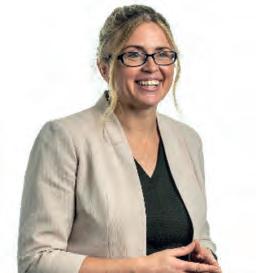
Many universities are reducing the number of days students need to be on campus so they can take paid work, as they acknowledge undergraduates are struggling to cope with the cost-of-living crisis.
Universities are compacting timetables rather than having lecturers and seminars dotted throughout the week.
A recent study discovered that more than half of students now work while studying, up from 45% last year and 34% in 2021.
Maintenance loans now barely cover accommodation costs, and the number of students juggling study and work is expected to rise to two-thirds for this year’s intake.
The move also helps commuter students – those who have opted to live at home.
“So, tell me about yourself?” This will probably be one of the first questions the interviewer will ask you. So, how do you answer this to give a good first impression?
1. Give a brief overview of your educational and professional background which could be useful for the role.
2. Talk about the relevant skills and expertise you have which directly relate to this opportunity.
3. Explain what you are looking for in your next role and why this role appealed to you. Practice to make your answer perfect!
First-timers earn more Graduates whose parents did not go to university typically earn more than their peers,
according to new research from Universities UK.
These first-generation students are more likely to be studying career-focused degrees at university (like accountancy!), which command higher salaries on graduation.
It means first-generation scholars earn an average starting salary of £30,111, which is nearly £3,000 more than those whose parents had the university experience.
And having that degree also helped these graduates up the career ladder quicker. Some 78% of graduates and 71% of business leaders who were firstgeneration university students said having a degree opened doors for them.
The PQ Book Club: books you should read
All Pride, No Ego: A Queer Executive’s Journey to Living and Leading Authentically, by Jim Fielding (Wiley £21.99)

Is there a glass ceiling for queer people, wonders Jim Feilding in his wonderful new book. There are lots of initiatives to diversify boardrooms, and states including California have even mandated gender diversity, but he wonders if it is enough. As Fielding notes, systematic change moves at a snail’s pace, and I love the fact that he says: “I am not sure if it is my arrogance or my naivete that had me assuming I would be on more boards of directors by now.”
The veteran executive tells his
wonderful story from the vantage point of an LGBTQ+ person, and wants to hold the hand of anyone who feels marginalized and excluded and show them there is a way to succeed. Going on the journey with him is a pleasure. He was endlessly bullied growing up and admits he also bullied himself, but a small flicker of confidence let him believe life was going to get better. It means, of course, he understands and advocates why it is so important mental health and students’ emotional well-being is openly
discussed in schools.
The ‘Selfish Is Not a Bad Word’ chapter opens with a great look at his childhood and how James became Jim, and even JD. But he also asks whether you have stopped along the way in your career to smell the roses! His mum had always asked him to do that, but the rush for titles, money and promotions can get in the way.
PQ rating 5/5: Jim, you done good! A truly authentic voice, he ends the book by saying you should love yourself and take care of each other. True, that!
PQ 39 PQ Magazine October 2023
PQ
careers
New spending record for Premier League
The 2023 summer transfer window saw Premier League clubs spend a record £2.36bn, according to Deloitte’s Sports Business Group. This exceeds the previous record (£1.92bn), set only last summer, by almost £440m.
Following the introduction of the current transfer system in
January 2003, it took 14 summer transfer windows for gross spend to exceed £1bn in a single window (summer 2016: £1.16bn).
It has taken half the time (seven summer windows) for spending in an individual window to surpass £2bn, highlighting the Premier League’s exponential growth.
Premier League clubs received
All the president’s men
ICAEW recently highlighted ‘10 things you didn’t know about ICAEW’. For instance, did you know that for his work on sustainability in accountancy King Charles III is an honorary member? The ICAEW is also duty bound by its royal charter to work in the public interest.
The presence of the Big 4 in the early presidents list is also very evident. The third person to hold the role was Arthur Cooper (now the ‘C’ in PwC) from 1883 to 1884. His brother Ernest served, from 1892 to 1901. As ICAEW, says the other Big 4 accounting firms are also there at the start. Fredrick Whinney, one of EY’s founders, ruled for four years, while William Deloitte served from 1888 to 1899. One of KPMG’s founders, William Barclay Peat, had two goes as president, from 1906 to 1908.

PQ PODCAST OF THE MONTH
The Account is a Professor Richard Murphy podcast about how we sort out the UK economy to fund a fair future: https://richardmurphy7.podbean.com/

Bogus Numbers: This episode explains it is increasingly hard to determine what the truth in accounts and economic data might be. Finance directors do not recognise their own, supposedly true and fair, financial reports as representing the companies that they manage. The Office for National Statistics is putting out figures for the national debt that are 12.7% overstated and figures for GDP that are 10% overstated. It really is time that we stopped trying to manage the economy on the basis of bogus data.
Other podcasts include ‘What is Money?’, ‘The Role of Tax’, and ‘Money Worries’.
See: https://richardmurphy7.podbean.com/e/bogus-numbers
a total of £550m in transfer fees from overseas clubs, more than two-and-a-half times higher than ever before (summer 2022: £210m), with £245m of these receipts coming from Saudi Pro League clubs.
Championship clubs’ gross spend (£140m) was the highest since before the pandemic (2019:
£160m); however, the overall net receipt (£320m) was also the highest on record.
Telsa’s “master of coin” leaves with coin!
Tesla’s 39-year-old CFO, Zachary Kirkhorn, has resigned from the company, with a reported fortune of over £130m. Kirkhorn joined Telsa from McKinsey in 2010 as a financial analyst. He became CFO in 2019, where his take home salary was around $1.2m a year.
However, Kirkhorn has stocks and options worth $168m. In the four years he was CFO the company’s share price has risen by 1,480%.
When Elon Musk was naming himself ‘Technoking of Telsa’, he named Kirkhorn his ‘Master of Coin’, a reference to the TV series Game of Thrones. Telsa’s chief accounting office, Vaibhav Taneja, has been named the new CFO. Taneja is Telsa’s fifth CFO in 10 years.

Super brain yoga
How did your ACCA exam revision go? Did you pull your ears to increase your awareness and mental ability to study and perform better in your exams? It’s called super brain yoga! But what happens if you get a super hard question – pull on your ears harder? The answer is no, and we loved this study resource video from ACCA India encouraging students to use all the available help online from ACCA. Check out the video at http://tinyurl.com/2hfy9he9. OK, it’s not a new video, but the message is still the same. Oh, and the video has had 181K views!

WE V E G O T T H E L O T ’
Where’s me satsuma?
Bob Mortimer’s wonderful off-the-wall crime fiction, ‘The Satsuma Complex’, is one of this month’s giveaways. Beware the talking squirrels, we say! At the end of the book you are even given Bob’s ‘17 Rules of Life’. These include always keeping some pocket meat or cheese about your person, and eat pie as often as you can. Tired of pie, tired of life. This is something PQ magazine lives by too!

We have three copies of ‘The Satsuma Complex’ for you this month, and if you want to be in the draw to win one send your name and address to giveaways@pqmagazine.com. Head up your email ‘Pocket meat’.
Super fiendish
Need to get away from revision? Then immerse yourself in 200 Times Super Fiendish Su Doku puzzles. We are told that these puzzles will be enough to exercise the most experienced Su Doku enthusiast, and are perfect for the advanced solver looking for a real challenge. Will you make it all the way to the end?
We have three copies of ‘The Times Super Fiendish Su Doku Book 1’ up for grabs. To be in the draw send an email headed up ‘Super Fiendish’ to giveaways@pqmagazine.com. Don’t forget to include your name and a postal address – just in case you win!

Terms and conditions: One entry per giveaway please. You must send your name and address to be entered for the draw. All giveaway entries must be received by Friday 8 May. The main draw will take place on Monday 11 May 2020.
Terms and conditions: One entry per giveaway please. You must send your name and address to be entered for the draw. All giveaway entries must be received by Friday 13 October 2023. The main draw will take place on Monday 16 October 2023.
TO ENTER THESE GIVEAWAYS EMAIL GIVEAWAYS@PQMAGAZINE.COM
PQ the got a story, funny or serious, you want to share? Email graham@pqmagazine.com
Tesla Inc
TO
THESE GIVEAWAYS EMAIL
PQ got a story, funny or serious, you want to share? Email graham@pqmagazine.com
ENTER
GIVEAWAYS@PQMAGAZINE.COM
40 PQ Magazine October 2023

























































































































































































































































































